 15/11/2009 05:00 15/11/2009 05:00 |
|
| | | OFFLINE | | Post: 18.867
Post: 1.515 | Registrato il: 28/08/2005
Registrato il: 20/01/2009 | Administratore | Utente Veteran | |
|

 See preceding page for all other 11/14/09 stories.
See preceding page for all other 11/14/09 stories.
 Two state visitors today at the Vatican:
WITH THE PRESIDENT OF SERBIA
Two state visitors today at the Vatican:
WITH THE PRESIDENT OF SERBIA

This morning the Holy Father received in audience Boris Tadic, president of the Republic of Serbia.
The president subsequently went on to meet with Cardinal Secretary of State Tarcisio Bertone S.D.B. who was accompanied by Archbishop Dominique Mamberti, secretary for Relations with States.
During the meetings, which took place in a very cordial atmosphere, the positive state of bilateral relations was highlighted. Particular attention was given to the main regional challenges and to Serbia's journey towards full integration into the European Union.
The contribution the Catholic Church wishes to make to Serbian society was underlined, with mention being made of the factors appropriate to ensuring her presence and activities therein.
Furthermore, the positive dialogue with the Orthodox Church was noted, also with a view to the 2013 commemoration of the Edict of Milan, the work of the emperor Constantine who was born in Nis.
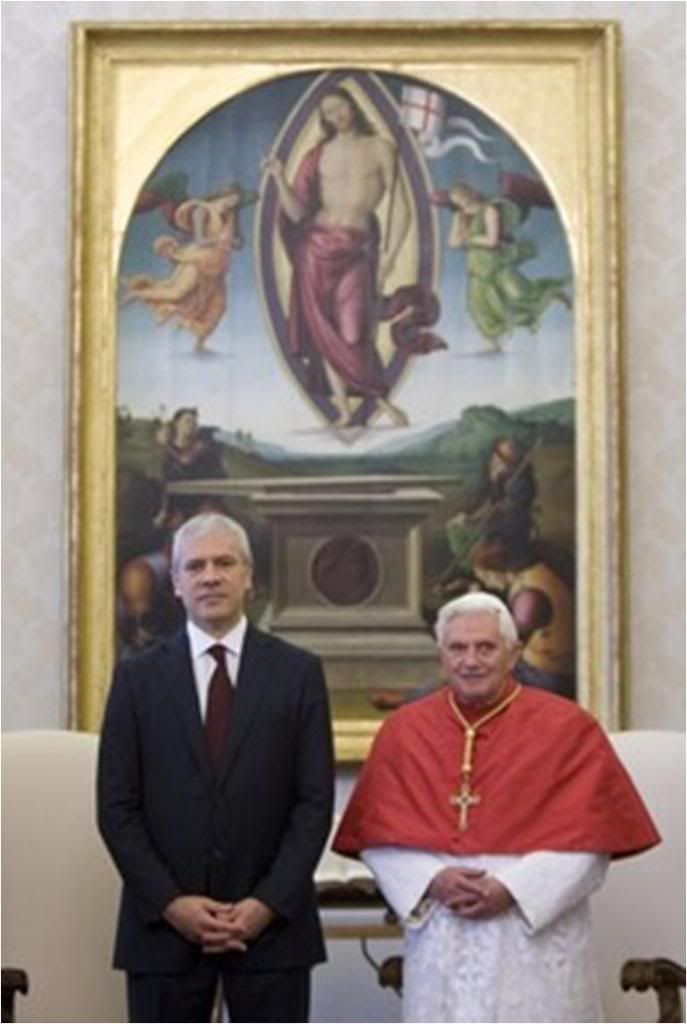

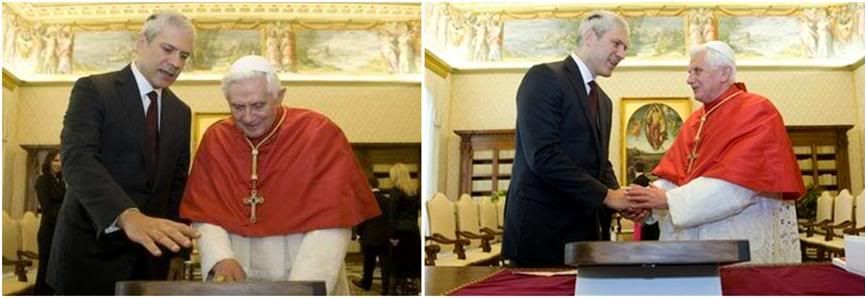 WITH THE PRIME MINISTER
WITH THE PRIME MINISTER
OF THE CZECH REPUBLIC

This morning the Holy Father Benedict XVI received in audience Jan Fischer, prime minister of the Czech Republic.
The Prime Minister subsequently went on to meet with Cardinal Secretary of State Tarcisio Bertone S.D.B. who was accompanied by Archbishop Dominique Mamberti, secretary for Relations with States.
The cordial discussions provided an opportunity to continue conversations that had begun during His Holiness Benedict XVI's recent apostolic trip to the Czech Republic.
The good relations that exist between the Holy See and the Czech Republic were highlighted, and the mutual desire confirmed to continue constructive dialogue on bilateral themes concerning relations between the ecclesial and civil communities.
Finally, an exchange of opinions took place on questions concerning current international relations, in particular the coming into effect of the Treaty of Lisbon.
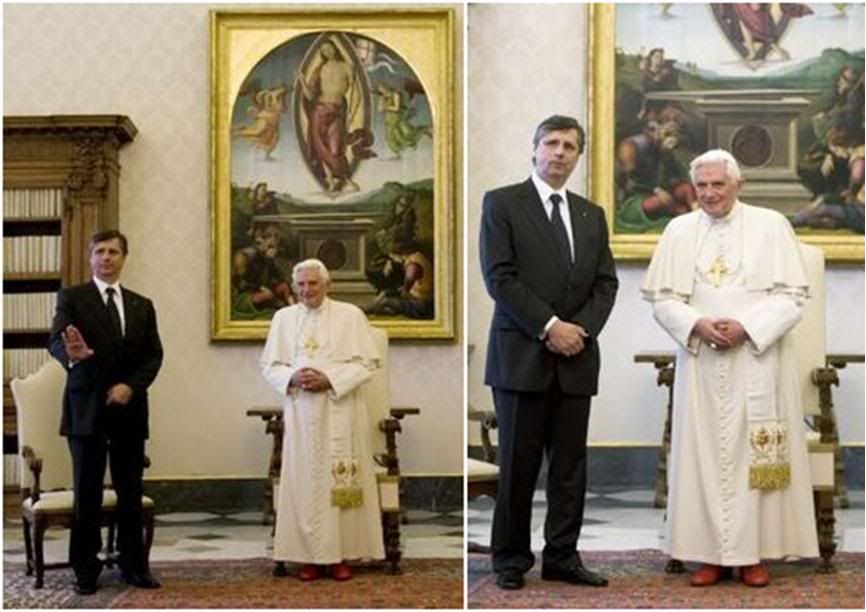
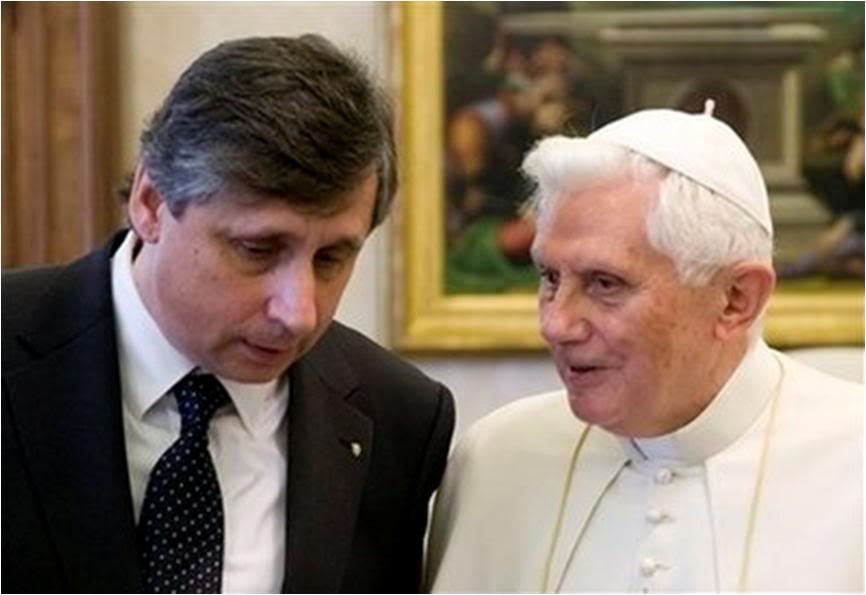
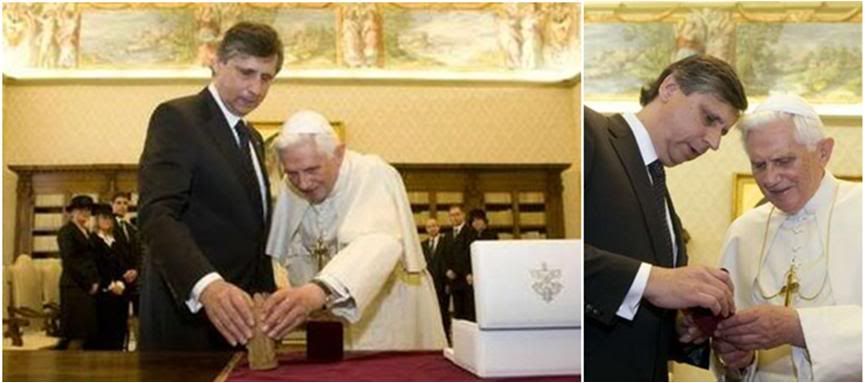
[Modificato da TERESA BENEDETTA 15/11/2009 05:11] |
| |
|
| |
 15/11/2009 13:54 15/11/2009 13:54 |
|
| | | OFFLINE | | Post: 18.869
Post: 1.517 | Registrato il: 28/08/2005
Registrato il: 20/01/2009 | Administratore | Utente Veteran | |
|
 Sunday, Nov. 15
Sunday, Nov. 15
 ST. ALBERTUS MAGNUS (ALBERT THE GREAT) (Germany, 1193-1280)
ST. ALBERTUS MAGNUS (ALBERT THE GREAT) (Germany, 1193-1280)
Dominican, Philosopher, Bishop, Doctor of the Church
Considered the greatest German scholar, theologian and philosopher of the Middle Ages, Albert the Great advocated the peaceful coexistence of science
and religion. In his writings, Albert commented on all of Aristotle's works and tried to explain as much as was known of the world at the time. He became
a mentor to Thomas Aquinas, whom he outlived. After serving as Provincial in Germany for the Dominican order, he was made Bishop of Regensburg
but gave it up after three years, preferring to return to teaching in Cologne where he died at age 87. He was canonized by Pius XI in 1931 and named
a Doctor of the Church ['Doctor of Science'].
OR today.
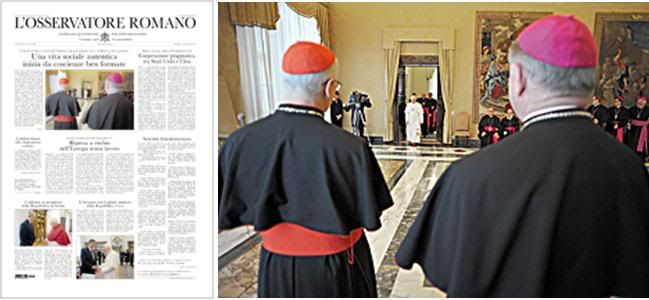
The Pope addresses the bishops of southern Brazil on ad limina visit:
'An authentic social life begins with well-formed consciences'
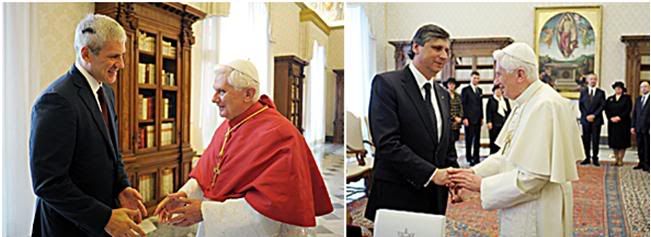 Other papal stories on Page 1: the audiences with President Boris Tadic of Serbia (left photo) and Prime Minister Jan Fischer
Other papal stories on Page 1: the audiences with President Boris Tadic of Serbia (left photo) and Prime Minister Jan Fischer
of the Czech Republic (right). Other Page 1 stories: Cardinal Kasper's first extended commentary on Anglicanorum coetibus
[translated and posted on this thread yesterday - see preceding page]; Obama's foreign policy in Asia looks to pragmatic
cooperation with China; the European Union warns that economic recovery is doubtful without new jobs. The inside pages
contain two articles on recently found documentary films showing the work Pius XII did during World War II to help persecuted
Jews; and an essay by art historian Timothy Verdon on the Pope's coming encounter with contemporary artists.
THE POPE'S DAY
Sunday Angelus - The Holy Father spoke about Jesus's words from today's Gospel on his words
'which will not pass away'. After the prayers, he acknowledged the work last week of the European
Bishops' Commission for the Media on how the Church can best avail of the new information technologies.
NB: I find the resemblance to Benedict XVI of the Albertus Magnus iconography in the first portrait above and the medal quite striking.
[Modificato da TERESA BENEDETTA 15/11/2009 15:30] |
| |
 15/11/2009 14:30 15/11/2009 14:30 |
|
| | | OFFLINE | | Post: 18.870
Post: 1.518 | Registrato il: 28/08/2005
Registrato il: 20/01/2009 | Administratore | Utente Veteran | |
|
 ANGELUS TODAY
ANGELUS TODAY
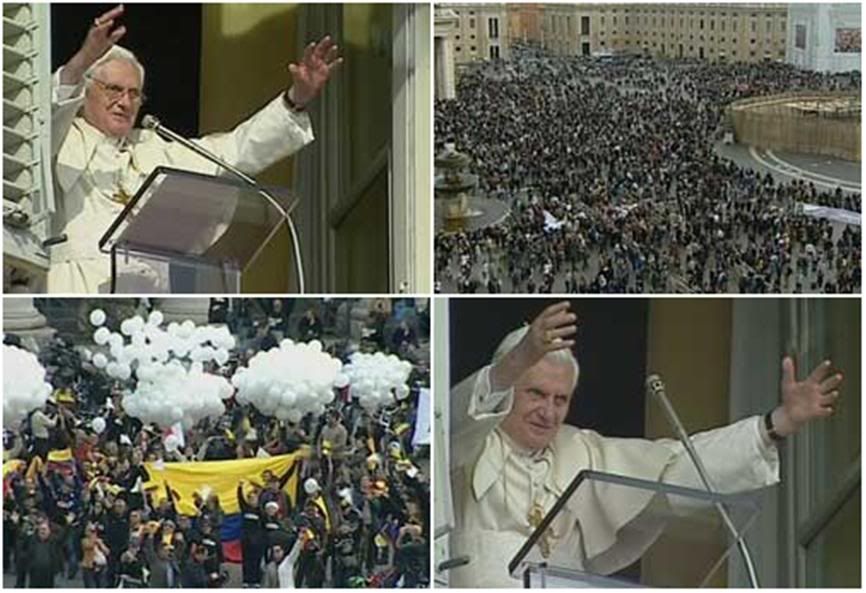
The Holy Father spoke about Jesus's words from today's Gospel on his words 'which will not pass away'. After the prayers, he acknowledged the work last week of the European Bishops' Commission for the Media on how the Church can best avail of the new information technologies.
However, his emphasis was different in his greeting to English-speaking pilgrims:
During this month of November, we remember especially the Holy Souls in Purgatory. In recent days we prayed for those who lost their lives in war, and on this World Day of Remembrance for Road Traffic Victims, we pray for all who have been killed or injured in road accidents.
As we commend their souls to the loving mercy of Almighty God, we also invoke his consolation upon their families and loved ones.
For those of you who have travelled long distances to be here today, I pray that you may have a safe homeward journey. May God bless all of you, and your families and friends.
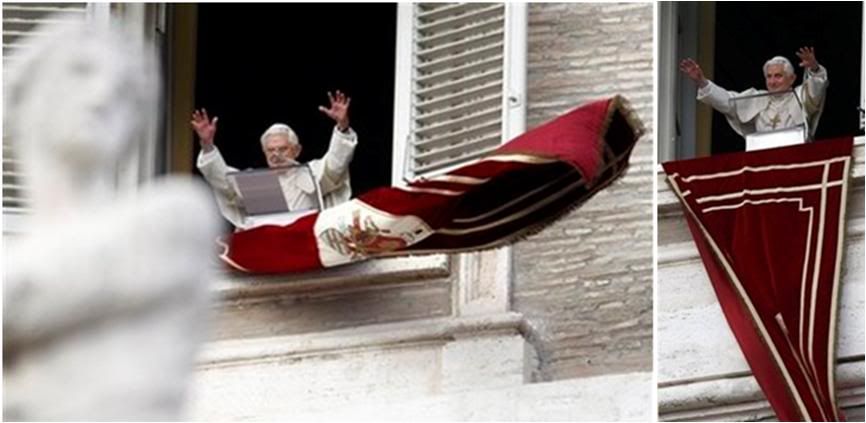 Here is a translation of the Pope's words at Angelus today:
Here is a translation of the Pope's words at Angelus today:
Dear brothers and sisters:
We have reached the last two weeks of the liturgical year. Let us thank the Lord that he has allowed us to complete once more this path of faith - ancient and ever new - in the Church's great spiritual family.
It is an invaluable gift that allows us to live in history the mystery of Christ, receiving into the furrows of our personal and communitarian life the seed of the Word of God, the seed of eternity which transforms this world from within and opens it to the Kingdom of the heavens.
In our itinerary through Sunday Biblical readings, we have been accompanied by the Gospel of St. Mark, which presents us today with part of Jesus's discourse on the end of times.
There is a sentence in it that strikes us for its synthesizing clarity: "Heaven and earth will pass away, but my words will not pass away" (Mk 13,31). Let us stop to reflect on this prophecy of Christ.
The expression 'heaven and earth' is used often in the Bible to indicate all of the universe, the entire cosmos. Jesus says that all this is destined to 'pass away'. Not just the earth, but also heaven, which is understood here in the cosmic sense and not as a synonym for God.
Sacred Scripture does not have ambiguities: all creation is marked by finitude, including elements that were divinized in ancient mythologies. There is no confusion whatsoever between Creation and the Creator, but a clear difference.
With such clear distinction, Jesus states that his words 'will not pass away", that is, they are from God and therefore are eternal. Although pronounced in the concreteness of his human existence, they are words of prophecy par excellence, as Jesus says elsewhere when addressing the heavenly Father: "The words you gave to me I have given to them, and they accepted them and truly understood that I came from you, and they have believed that you sent me" (Jn 17,8).
In a famous parable, Christ likens himself to a sower and explains that the seed is the Word of God (cfr Mk 4,14): those who heed it, accept it and bear fruit (cfr Mk 4,20), are part of the Kingdom of God, that is, they live under his lordship. They remain in the world but are no longer of the world - they carry in themselves a seed of eternity, a principle of transformation that is manifested even today in a good life, inspired by charity, and will in the end result in the resurrection of teh body. And that is the power of the Word of Christ.
Dear friends, the Virgin Mary is the living sign of this truth. Her heart was 'good earth' which received the Word of God with full disposition, so that her whole existence, transformed by the image of the Son, was introduced to eternity, body and soul, anticipating the eternal calling of every human being.
How, in prayer, let us make ours her response to the Angel: "Be it done to me according to your Word" (Lk 1,38), so that in following Christ on the Way of the Cross, we too may reach the glory of resurrection.
After the prayers, he had these special messages:
I wish first of all to address a special greeting to the participants of the Plenary Assembly of the European Bishops' Commission for Media, who met this week at the Vatican.
Dearest ones, you confronted the culture of the Internet and communications within the Church. I thank you for your well-qualified contribution to this topic of great relevance.
I also wish to point out that today, Ivrea in the Piedmont region is observing Thanksgiving Day. I gladly join spiritually all those who are grateful to the Lord for the fruits of the earth and man's labor, renewing my urgent appeal for respect of the natural environment, a precious resource that is entrusted to our responsibility.
To Polish pilgrims, he said:
Today is the World Day in memory of victims of road accidents. I entrust the victims to God's mercy, and I encourage all who drive around the world to prudence, to a sense of responsibility for the gift of good health and of one's own life and that of others.
May the Lord protect all who travel and bless them all.
At the end, he said this in Italian:
Also present today in St. Peter's Square are Cardinal Adrianus Simonis with some prelates, civilian authorities and faithful from the Netherlands, who, in celebrating these days their Patron Saint Willibrord, have marked their visit to Rome in the national church of Saints Michael and Magnus of the Frisians.
I call on everyone to always be the living stones of the Church of Christ, and to intensify the bonds of communion with the See of Peter.
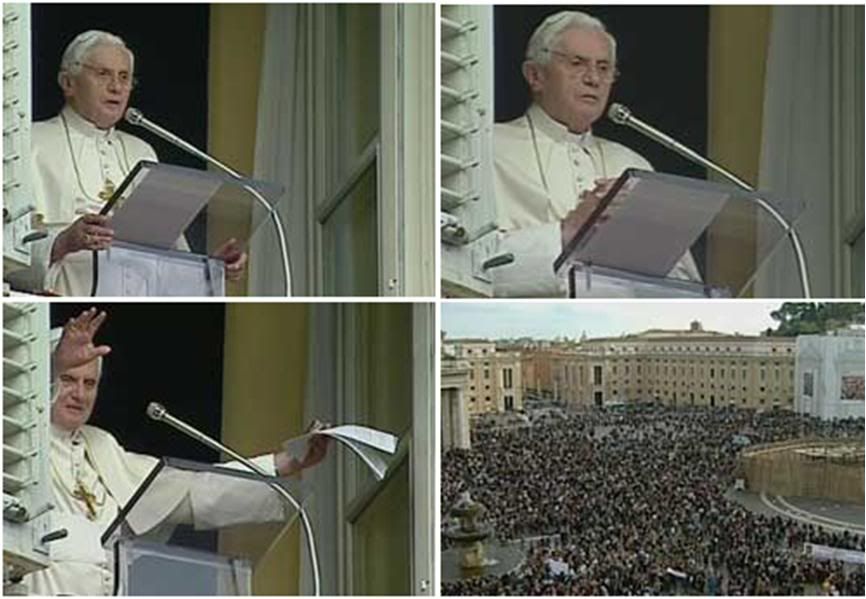
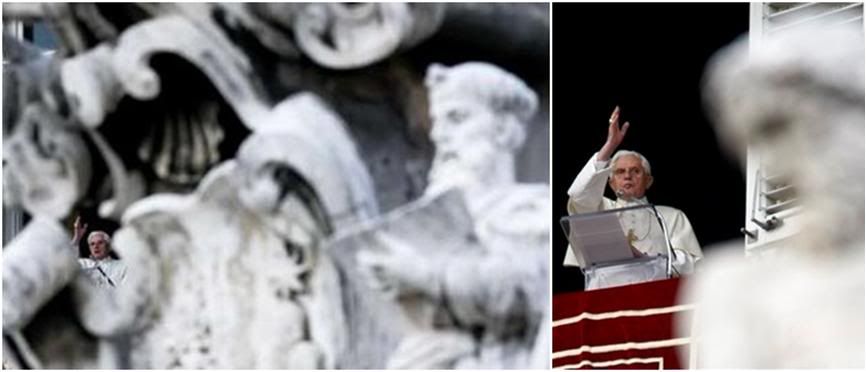
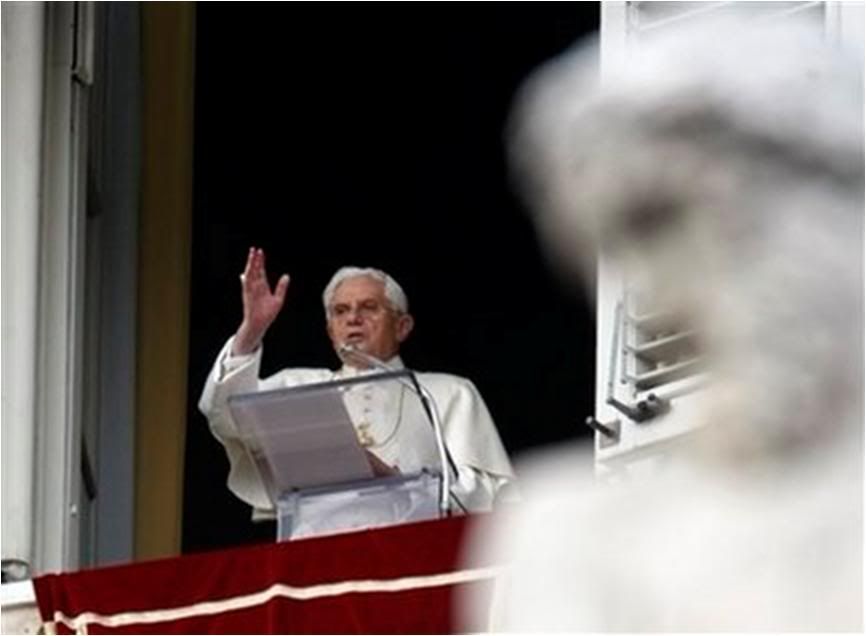
[Modificato da TERESA BENEDETTA 15/11/2009 22:17] |
| |
 15/11/2009 15:57 15/11/2009 15:57 |
|
| | | OFFLINE | | Post: 18.871
Post: 1.519 | Registrato il: 28/08/2005
Registrato il: 20/01/2009 | Administratore | Utente Veteran | |
|

 Pope to open World Food Security summit
Pope to open World Food Security summit
tomorrow - but G8 leaders won't be there
by GINA DOGGETT

ROME, Nov. 15 (AFP) - Pope Benedict XVI will be among the inaugural speakers but the leaders of the world's wealthiest nations will be conspicuous by their absence as more than 60 heads of state and government gather in Rome this week for a UN summit on the plight of the planet's billion hungry.
Italian Prime Minister Silvio Berlusconi is the only leader from the Group of Eight industrialised countries expected to attend the "Hunger Summit" from Monday through to Wednesday, at the Rome headquarters of the United Nations' Food and Agriculture Organisation (FGAP)
Also expected at the summit are Brazilian President Luiz Inacio Lula da Silva, Muammar Gaddafi of Libya, Egypt's Hosni Mubarak and Venezuela's Hugo Chavez.
Zimbabwean President Robert Mugabe of arrived on Saturday with an entourage of about 60. His human rights record has seen him barred from travelling to the European Union, except for international gatherings, since 2002.
Humanitarian groups warned last week that the summit could be a "waste of time", calling for the commitment of new resources to fight hunger.
"It's a tragedy that the world leaders are not going to attend the summit," said Daniel Berman of Medecins sans Frontieres.
A draft declaration already circulating ahead of the meeting is "just a rehash of old platitudes", said Francisco Sarmento, ActionAid's food rights coordinator.
Oxfam spokesman Frederic Moussea said: "Rich countries are failing to show enough interest and urgency.
"At the G8 in Italy this summer they pledged $US20 billion ($A21.7 billion) for agriculture over three years, so they believe they have done enough. They haven't - and the $US20 billion ($A21.7 billion) is a mirage," he said.
Even the Italian Catholic Church warned of a possible "flop" unless the summit produces concrete commitments.
The Italian bishops' newspaper Avvenire lamented that the draft final declaration makes no mention of the $US44 billion ($A47.7 billion) a year that FAO chief Jacques Diouf is seeking for agriculture in poor countries.
UN Secretary-General Ban Ki-moon will prod world leaders to step up the fight against global warming as well as hunger during his stop at the summit.
"Given the close inter-relationship between food security and climate change, the secretary-general will engage world leaders to advance both agendas together," a spokeswoman said last week.
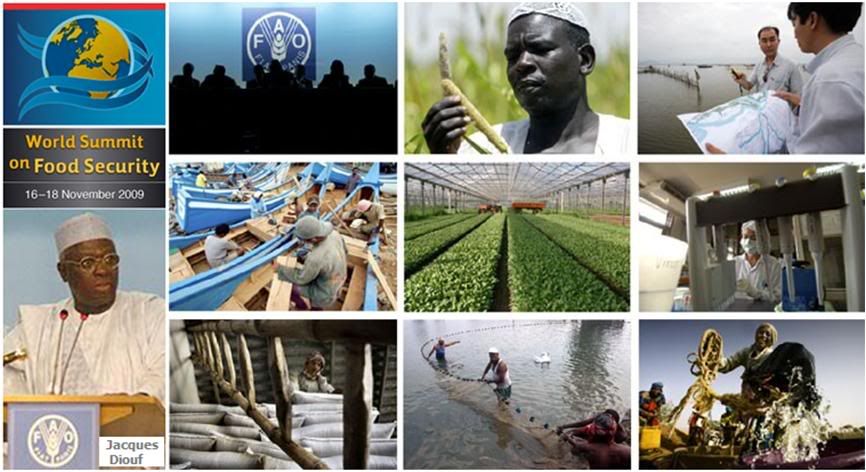
To help create a sense of urgency ahead of the summit, Diouf undertook a 24-hour fast on Saturday.
Diouf spent Friday night at FAO headquarters, sleeping on a makeshift mattress of foam blocks, the UN agency said in a statement.
"I hope that through these gestures we will raise awareness, and build pressure from public opinion," Diouf said.
"Every six seconds a child dies of hunger," Diouf said last week. "This enormous tragedy is not only a moral outrage and an economic absurdity, but also it presents a serious threat to our collective peace and security."
Agricultural production must increase 70 per cent if the world is to feed the population of nine billion by 2050, according to the FAO.
Non-governmental organisations plan a parallel forum with the slogan "People's Food Sovereignty Now!" to be attended by Diouf and Rome mayor Gianni Alemanno.
More than 400 delegates from about 70 countries will attend the forum.
On Sunday evening, the international anti-poverty agency ActionAid plans a "Stop Hunger!" vigil at Rome's Colosseum, which will be lit up for the occasion.
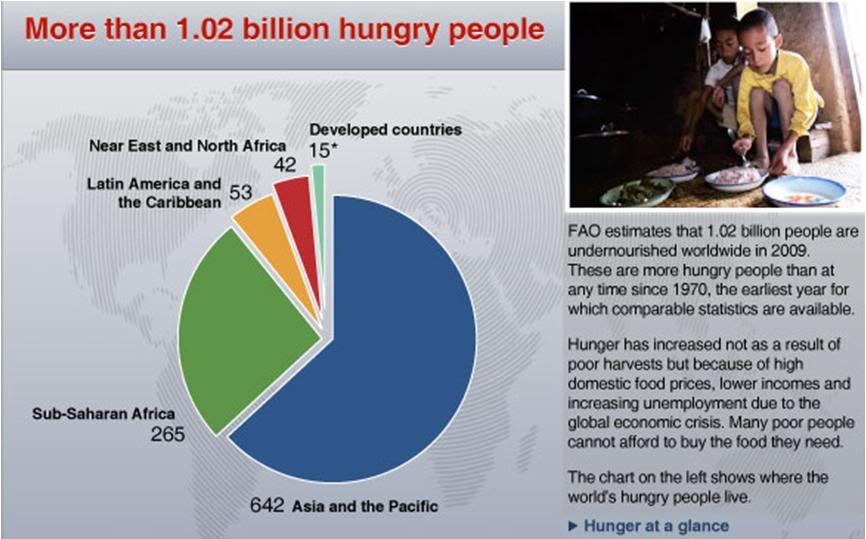 I believe it is a genuine scandal and a crying shame that the leaders of the world's richest nations appear to be far more concerned about global climate change - a 'cause' that continues to be questionably founded from the scientific point of view and appears to be more political hype than objective fact - and the coming Copenhagen conference about this in December, than they are about global hunger which has been growing alarmingly [see above 'fact bite'].
I believe it is a genuine scandal and a crying shame that the leaders of the world's richest nations appear to be far more concerned about global climate change - a 'cause' that continues to be questionably founded from the scientific point of view and appears to be more political hype than objective fact - and the coming Copenhagen conference about this in December, than they are about global hunger which has been growing alarmingly [see above 'fact bite'].
UN Secretary-General Ban Kim-moon, who is completely sold on the idea that there is now a 'world climate crisis' that cannot wait, has not helped matters by his apparent lack of a balanced view and a failure to prioritize the world's problems properly.
Yes, every individual and nation must do what they can - and right now - to safeguard the environment and to reduce greenhouse gas emissions which could be a contributing factor to climate modification [but not as much as natural atmospheric cycles and patterns that have been observed and recorded historically].
But not with Draconian and greatly unaffordable measures that will bring immediate negative fallout on the very populations that can least afford more economic drawbacks at this time.
Meanwhile, what about the pledges made by the G8 to the FAO?
Why don't the rich liberal governments more interested in radically chic political correctness than in actual relevance - pay up for the world food fund first before spending on their various climate-change causes?
[Modificato da TERESA BENEDETTA 15/11/2009 16:30] |
| |
 15/11/2009 21:04 15/11/2009 21:04 |
|
| | | OFFLINE | | Post: 18.873
Post: 1.521 | Registrato il: 28/08/2005
Registrato il: 20/01/2009 | Administratore | Utente Veteran | |
|
 Thanks to Lella and her invaluable blog
Thanks to Lella and her invaluable blog
 for this item which was provided to her way ahead of the scheduled Dec. 21 presentation of the new book in question.
'BENEDICT XVI:
for this item which was provided to her way ahead of the scheduled Dec. 21 presentation of the new book in question.
'BENEDICT XVI:
BEYOND FASHIONS IN THOUGHT'
by Cardinal Michele Giordano
Emeritus Archbishop of Naples
Preface to the new book by Francesco Antonio Grana
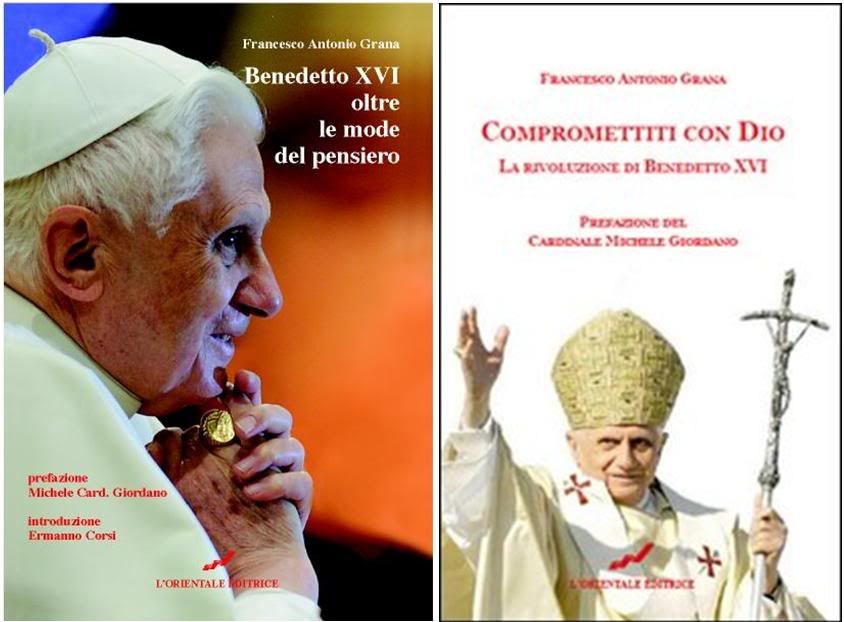 Left, Grana's new book on Benedict XVI; right, his first B16 book in 2007, 'Compromettiti con Dio' [Commit yourself to God: The revolution of Benedict XVI].
Left, Grana's new book on Benedict XVI; right, his first B16 book in 2007, 'Compromettiti con Dio' [Commit yourself to God: The revolution of Benedict XVI].
It is with joy that I present this book by Francesco Antonio Grana which puts together the interventions of Benedict XVI in the past two years.
The Holy Father's intense and farsighted Petrine ministry represents a singular way of expressing the charism unique to the Successors of the Apostle Peter, which is 'to confirm their brothers in their faith'.
It does not only mean reproposing revealed truths with clarity and fullness, but helping the faithful understand coherently, with the eyes of faith, the events and figures of contemporary history which would otherwise lose their genuine sense.
That is what our dearest Francesco Antonio has done, in reviewing the elevated Magisterium of the Pontiff, with the prophetic actions that complement his words, never tiring in exemplary fashion of repeating that our God is not remote but dwells in the heart of man.
Acknowledging the primacy of God carries with it the urgency of communicating it to the world and, wiht it, the need of living our charity, which must be universal as well as concrete, towards our neighbor.
Benedict XVI's apostolic trips, with his gentle and clear preaching, are sowing that universal connotation of love which begins the divinization of man.
The author faithfully conveys the thinking of the Pope, who underscores the absolute importance of the divine design expressed in the creation of man, and exhorts, beyond the spiritual atrophy of today, to overcoming the practical materialism that weighs on Western societies and the religious fundamentalism which uses the divine name to wreak intolerance and violence.
Believers and non-believers alike have responded to the Pope's openness, with joy and visible emotion, and always with exemplary respect, made aware that the urgency of truth defeats every form of dictatorship over the body and the spirit.
Even Pope Benedict XVI's liturgies demonstrate that the Christian faith is not an ideology, but the encounter with the person of Jesus.
The author presents the Pope's travels under its external signs of his smiling face and his open arms, with the discourses always focused on the concept of truth - a word which Christians identify with the name of God and that must be addressed to all the nations of the earth.
The book elicits, in a clear and correct way, those questions raised by religion, faith and ethics that Benedict XVI himself addresses, in order that the Christian message may continue to be one of the pillars on which to build European society and lay down the peace.
To the world, but especially to Europe, Christianity offers much, provided reason does not close its ears to the message of faith, and as long as Christians do not yield to the temptation of closing in on themselves, but rather, open up to dialog with other cultures and religions.
With the passion of a fervent believer, Francesco Antonio Grana hopes for a great intellectual, ethical and human dialog that will open new ways of reciprocal understanding, working together in concord and for the progress of the common good, in the service of consolidating the family of peoples.
Benedict XVI helps us to evaluate as protagonists the phenomenon of globalization - understood not only as a socio-economic process, but as an ethical criterion for relatedness, communion and sharing among peoples and persons (cfr. Benedetto XVI, Caritas in veritate, 42).
Proceeding rationally and guided by charity and truth, the world will develop global responsibility and brotherliness, rooted in natural law as the basis for the unity of the human species.
This work becomes a service to man with a view to a society that is more equitable and wise - service that makes the human and Christian riches of our nation more credible and authoritative.
The world of the third millennium has extreme need of a new humanism, which finds its most fertile roots in the coherence of ecclesial communion.
To repair the damage in the net of Christ that the Church is: that, too, is the purpose of many initiatives by Benedict XVI, cited in the text ,towards reconciliation and unity among Catholics and Christians.
This is how one must read the Pope's liberalization of the use of the Roman rite as practised before the liturgical reform by Paul VI, and the recall of the excommunication of the four bishops ordained without papal authority by Mons. Marcel Lefebvre.
The book makes evident the current Pontiff's incessant impulse towards ecumenism and patient intercultural and inter-religious dialog, which must resist yielding to relativism and syncretism if such efforts are to be authentic.
Benedict XVI faces his challenges with confidence in reason as a common principle and in responsibility as something stronger than any selfishness.
Like Francesco Antonio, we make this our hope as well, knowing that it will be possible with the help of prayer and the witness of our charity.
The reflections contained in this book will give more and better to anyone who reads it with love.
Michele Card. Giordano

The introduction to the Grana's book, by Ermanno Corsi, says:
With this new book, Francesco Antonio Grana presents Benedict XVI to the reader in his authenticity, minus the cliches which are customarily applied to him - from the statement on AIDS and condoms to the excommunication recall for the Lefebvrians, from the scandal of pedohpile priests to the encyclical Caritas in veritate.
Grana clearly highlights the limits of journalism today, too often prejudicially lined up in favor of a readymade thesis to the detriment of anything differentnand too often schematic, imprisoned in commonplaces and facile categorizations.
Mr. Grana obviously has close ties with Cardinal Giordano, who also wrote the preface for his first book. I first came across Grana's name because of a short vignette he contributed to Petrus early in 2008, and which I translated in the PRF. It was based on an exceptional firsthand narrative from Mons. Giordano and it very much bears re-posting:
HOW JOSEPH RATZINGER SAID 'YES'
ON APRIL 19, 2005
By Francesco Antonio Grana
Translated from

January 18, 2008
In his first encyclical, Redemptor hominis, John Paul II revealed, one year after his election as Pope, the answer he gave when he accepted his election in the sealed Sistine Chapel.
Benedict XVI has not done so, but Cardinal Michele Giordano, emeritus Archbishop of Naples, recounted how Cardinal Ratzinger accepted his election, at the recent presentation of my book Compromettiti con Dio. La rivoluzione di Benedetto XVI (Commit yourself to God: the rev0lution of Benedict XVI), L’Orientale Editrice.
"Before he was elected", Giordano recalled, "since I already thought he would be the next Pope, I approached him and said, full of confidence, even though like me, he was already past 75: 'If something happens in your favor, I hope you don't surprise us!' His face showed disturbance and he answered, 'Eminence, I cannot, I could not accept. Please, don't think of me! Don't think of me!"
"Then, after he was elected, he answered, 'Propter voluntatem Dei accepto' [Because it is the will of God, I accept], with the serenity that came with knowing that God had now chosen him."
The two cardinals are linked by a long friendship. Every time Cardinal Ratzinger came to Naples or passed through on his way to Capri or Ischia, he never failed to visit his brother cardinal, of whom he was a house guest many times.
Similarly, Benedict XVI has high esteem for two bishops who were auxiliaries to Cardinal Giordano in Naples: Mons. Vincenzo Pelvi, whom he recently named Military Archbishop Chaplain for Italy (his predecessor was Cardinal Bagnasco), and Cardinal Agostino Vallini, Prefect of the Supreme Tribunal of the Apostolic Segnatura, who is said to be most likely to be named the Pope's Vicar in Rome, to succeed Cardinal Camillo Ruini when he retires in February or March. [And indeed, Vallini is now Vicar in Rome.]
I have been unable to find any online biodata of Grana, but if he is the person on the Facebook entry with his name, it appears he graduated from the Catholic University of Milan and works for an international bank in London. He contributes to Avanti, the daily newspaper of the Italian Socialist Party, and last Sept. 28, I translated an article by him on "Benedict XVI: the teacher Pope" on Page 32 of this thread -
benedettoxviforum.freeforumzone.leonardo.it/discussione.aspx?idd=8527207&p=32&#idm...
[Modificato da TERESA BENEDETTA 15/11/2009 21:18] |
| |
 15/11/2009 22:12 15/11/2009 22:12 |
|
| | | OFFLINE | | Post: 18.874
Post: 1.522 | Registrato il: 28/08/2005
Registrato il: 20/01/2009 | Administratore | Utente Veteran | |
|
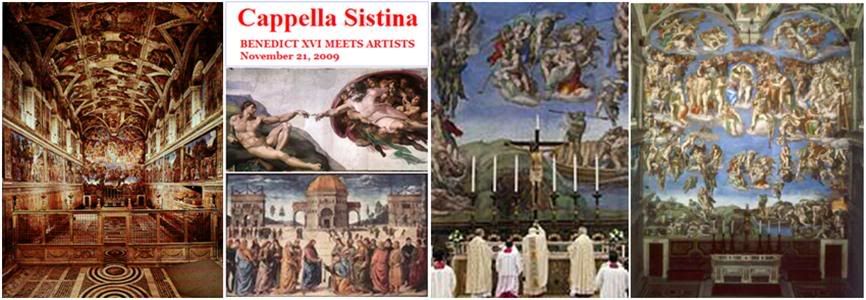 Normally, I might have posted this in NOTABLES, but since I am not translating the entire interview but using the pertinent excerpt lifted by Sandro Magister for his blog, it does belong here - sort of a companion piece to the Catholic Herald item in the preceding page on various UK-based artists speaking out on the Vatican initiative to enlist contemporary artists 'ad majorem Dei gloriam', as in pre-modern times.
Ennio Morricone speaks out
Normally, I might have posted this in NOTABLES, but since I am not translating the entire interview but using the pertinent excerpt lifted by Sandro Magister for his blog, it does belong here - sort of a companion piece to the Catholic Herald item in the preceding page on various UK-based artists speaking out on the Vatican initiative to enlist contemporary artists 'ad majorem Dei gloriam', as in pre-modern times.
Ennio Morricone speaks out
on music and liturgy
Translated from

November 14, 2009
"The history of music sprang from liturgical experiences. Opera came from sacred representations at Mass. Let us just think of most of the great composers, and the chapel choirmasters - all came from experience with sacred music and Gregorian chant.
"But the Church, after Vatican-II, has been losing the great tradition of the Gregorian chant. It's similar to what it was like just before the Council of Trent, when profane elements had been introduced to Church music.
"Benedict XVI is right to devote attention to this. Today, in churches, we are subjected to a mishmash in which for instance, the text of the Ave Maria is composed into country music".
Thus speaks Ennio Morricone, 81, Italy's great contemporary composer, with more than 50 million records sold from the 400 soundtracks to his name, many of them genuine masterpieces.
Someone who reveals that, in order to compose the soundtrack for the film 'Mission" about 18th century Jesuit missionaries in South America, he was inspired by "three widely diverse sources, such as the instrumental music of the Renaissance, the melodies of the reform period following the Council of Trent, and native American music - I worked very hard, but at the end, something like a miracle emerged that almost did not depend on me".
Morricone was interviewed for the 11/14/09 issue of Avvenire, from which the above excerpts come. He will be among the 262 artists who have accepted the Vatican invitation to meet Benedict XVI at the Sistine Chapel on Nov. 21.
And it is striking how much of what he says about sacred music coincides with the appeal for a rebirth of Christian arts recently addressed to the Pope by a group of artists and intellectuals.
 Sign up at
Sign up at
appelloalpapa@gmail.com
[Modificato da TERESA BENEDETTA 15/11/2009 22:15] |
| |
 16/11/2009 13:14 16/11/2009 13:14 |
|
| | | OFFLINE | | Post: 18.876
Post: 1.524 | Registrato il: 28/08/2005
Registrato il: 20/01/2009 | Administratore | Utente Veteran | |
|
 Monday, November 16
Monday, November 16
 ST. MARGARET OF SCOTLAND (1050-1093)
ST. MARGARET OF SCOTLAND (1050-1093)
Queen of Scots
A niece of Edward Confessor, she married the Scottish King Malcolm with
whom she had eight children. While maintaining her personal holiness with
rigorous private devotions, she was an exemplar of the 'just ruler'. Promoting
arts and education among her people and practising legendary charity,
she was also known for her efforts to reform religious abuses by priests
and lay people.
No OR today.
THE POPE'S DAY
Keynote address to World Food Security Summit at the Rome headquarters of the UN
Food and Agricultural Organization (FAO). Address in French.
In the afternoon, the Holy Father met at the Vatican with
- Bishops of Brazil on ad-limina visit
The Vatican released the text of the Holy Father's message to the Plenary Assembly of the Congregation
for the Evangelization of Peoples.
|
| |
 16/11/2009 14:10 16/11/2009 14:10 |
|
| | | OFFLINE | | Post: 18.877
Post: 1.525 | Registrato il: 28/08/2005
Registrato il: 20/01/2009 | Administratore | Utente Veteran | |
|
 Benedict XVI keynotes summit
Benedict XVI keynotes summit
on world food security

Nov. 16, 2009
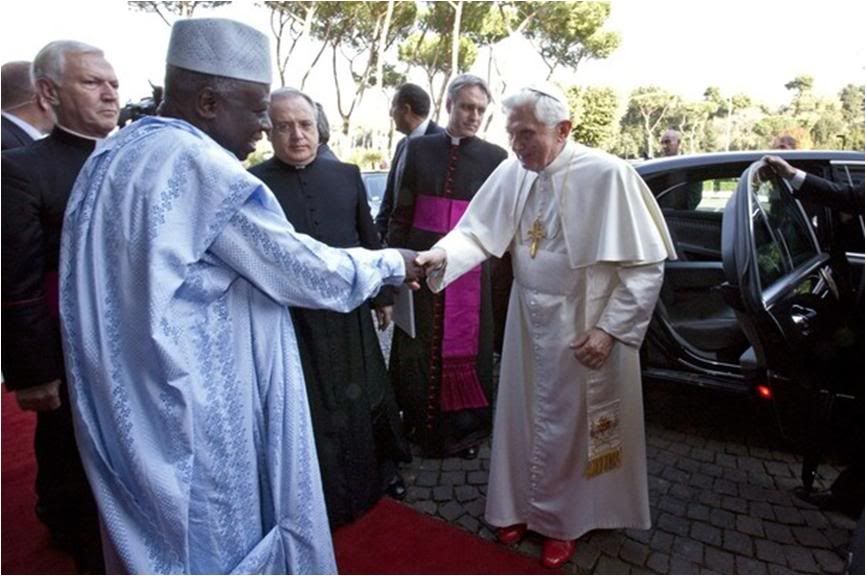
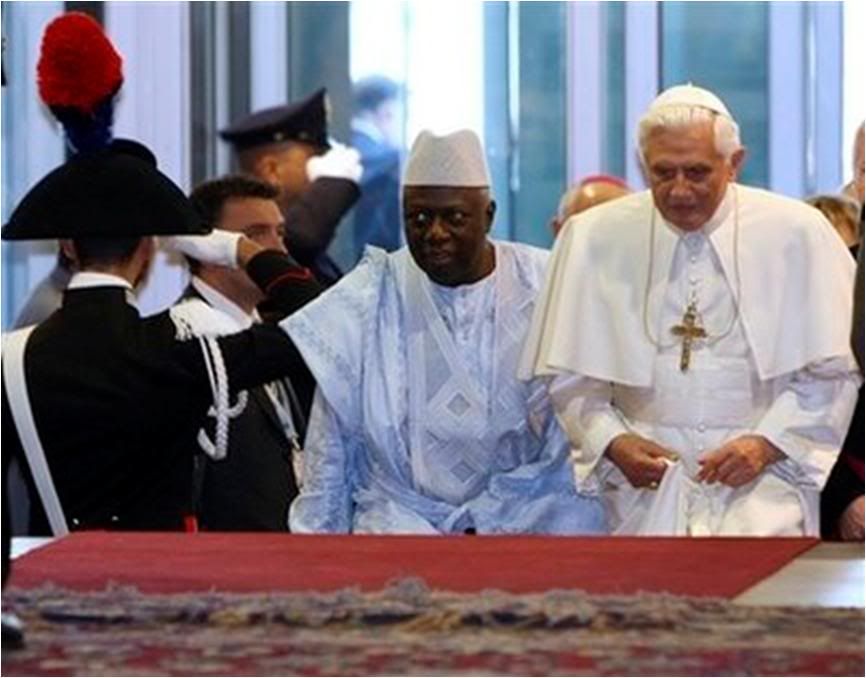
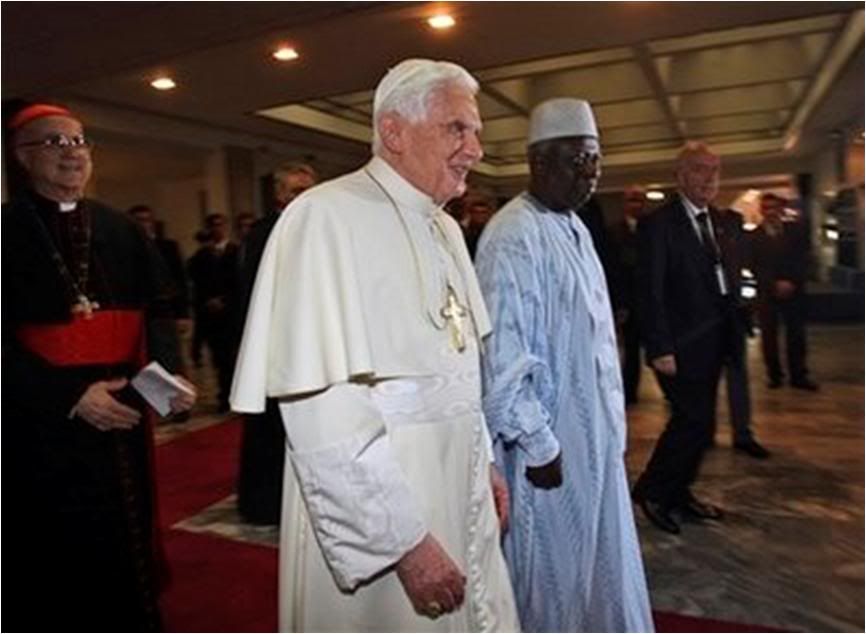
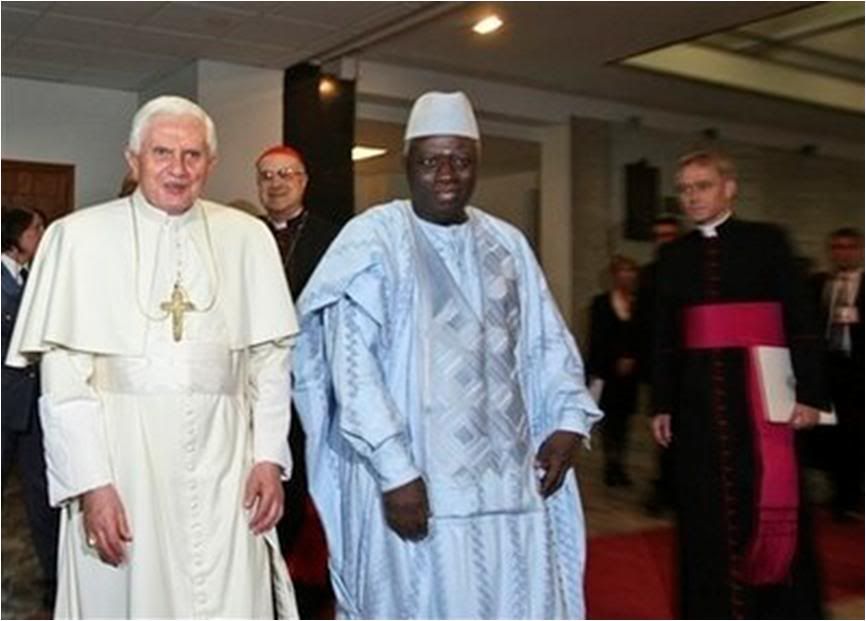
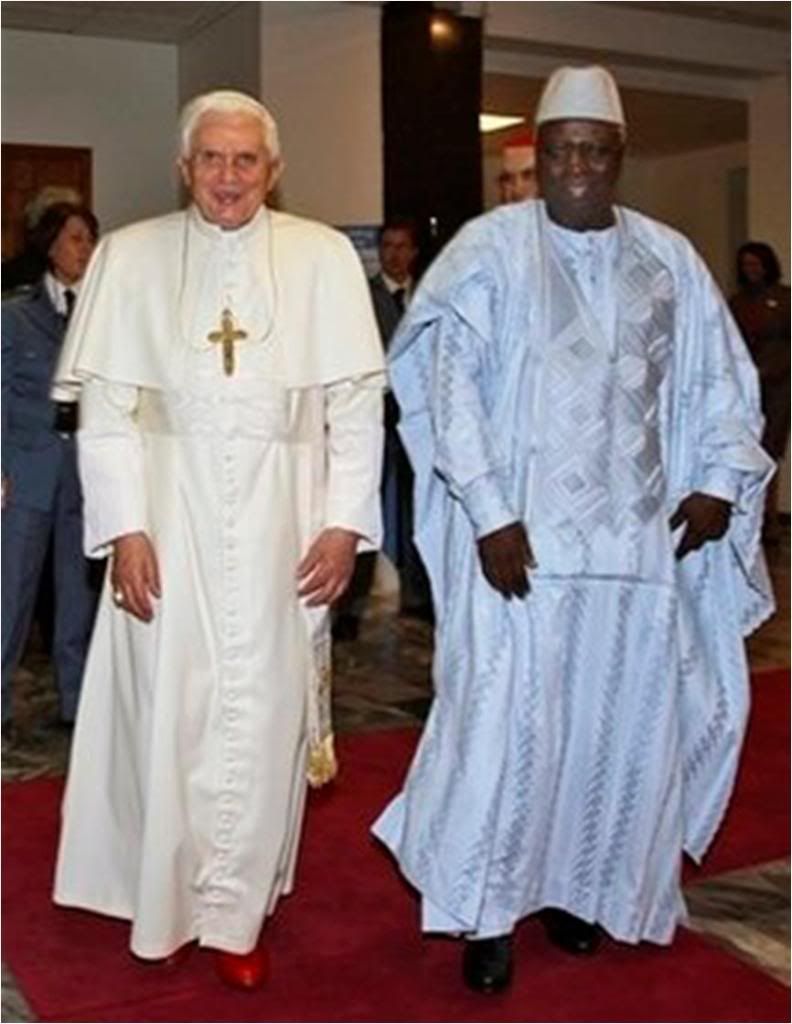
This morning, the Holy Father visited the headquarters of the Food and Agricultural Organization (FAO) for the opening of the World Summit on Food Security taking place Nov. 16-18.
The Pope arrived at the FAO at 11:30 a.m., and was welcomed by the Director-General, Jacques Diouf and by the vice directors of FAO.
On the third floor, before entering the Assembly Hall, the Pope was greeted by UN Secretary-General Ban Ki-Moon, the UN General Assembly president Sli Triki, and Italian prime Minister Silvio Berlusconi, in his capacity as presiding officer of this summit.
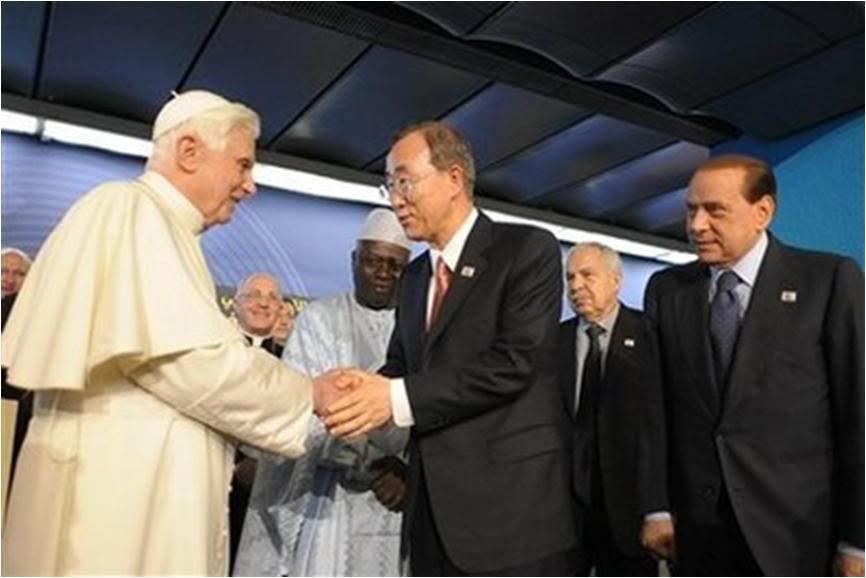
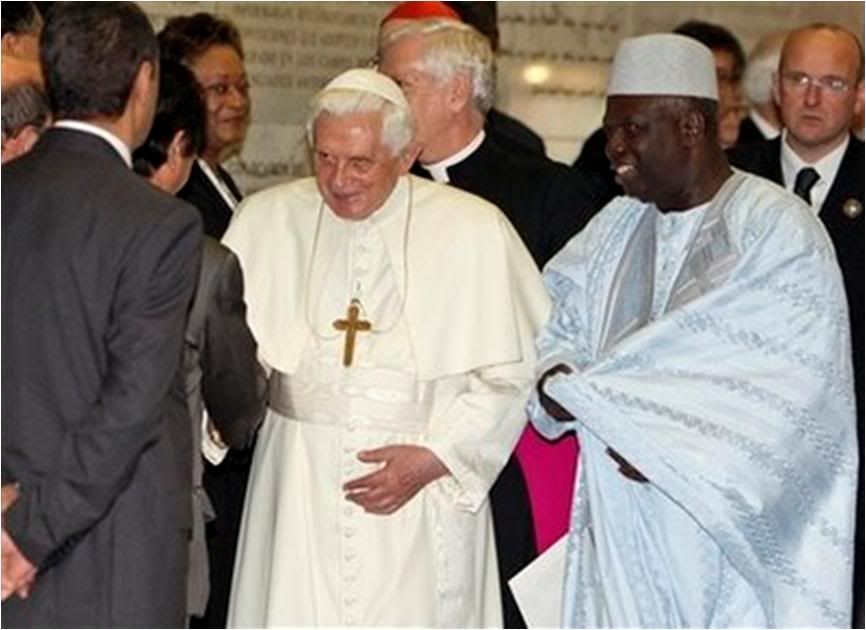
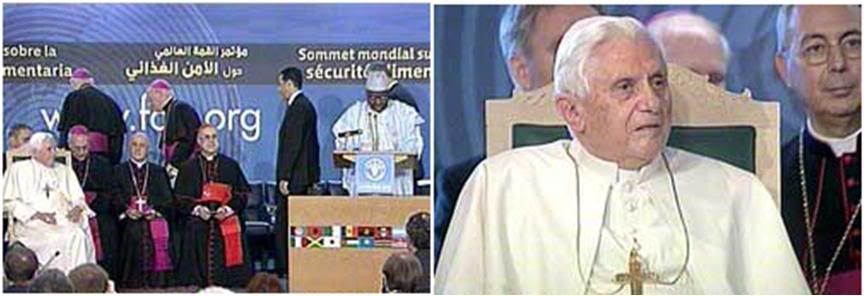
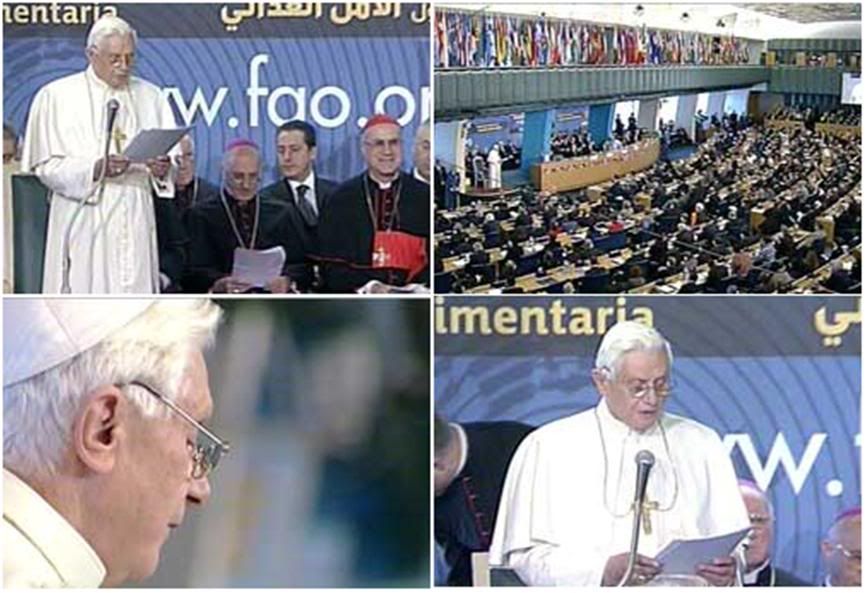
The Holy Father addressed the Assembly in French, but the Vatican also released translations in English, Italian and Spanish.
Mr President,
Ladies and Gentlemen!
1. I was very pleased to receive an invitation from Mr Jacques Diouf, Director General of FAO, to speak at the opening session of this World Summit on Food Security. I greet him warmly and I thank him for his kind words of welcome. I greet the distinguished authorities present and all the participants.
Echoing the sentiments of my venerable predecessors Pope Paul VI and Pope John Paul II, I should like once more to express my esteem for the work of FAO, which the Catholic Church and the Holy See follow attentively, taking a keen interest in the day-to-day work that is carried out there.
Thanks to your generous engagement, aptly expressed in your motto Fiat Panis, the development of agriculture and food security remain among the key priorities of international political action.
I am confident that this same spirit will inform the decisions taken at the present Summit, and those that will follow later, in the common desire to win the battle against hunger and malnutrition in the world as quickly as possible.
2. The international community is currently facing a grave economic and financial crisis. Statistics bear witness to the dramatic growth in the number of people suffering from hunger, made worse by the rise in price of foodstuffs, the reduction in economic resources available to the poorest peoples, and their limited access to markets and to food – notwithstanding the known fact that the world has enough food for all its inhabitants. Indeed, while low levels of agricultural production persist in some regions, partly owing to climate change, sufficient food is produced on a global scale to satisfy both current demands and those in the foreseeable future.
From these data we may deduce that there is no cause-and-effect relationship between population growth and hunger, and this is further demonstrated by the lamentable destruction of foodstuffs for economic gain.
In the Encyclical Letter Caritas in Veritate I pointed out that, "Hunger is not so much dependent on lack of material things as on shortage of social resources, the most important of which are institutional.
What is missing, in other words, is a network of economic institutions capable of guaranteeing regular access to sufficient food and water … and also capable of addressing the primary needs and necessities ensuing from genuine food crises …"
I added, "The problem of food insecurity needs to be addressed within a long-term perspective, eliminating the structural causes that give rise to it and promoting the agricultural development of poorer countries. This can be done by investing in rural infrastructures, irrigation systems, transport, organization of markets, and in the development and dissemination of agricultural technology that can make the best use of the human, natural and socio-economic resources that are more readily available at the local level, while guaranteeing their sustainability over the long term as well" (no. 27).
Hence the need to oppose those forms of aid that do grave damage to the agricultural sector, those approaches to food production that are geared solely towards consumption and lack a wider perspective, and especially greed, which causes speculation to rear its head even in the marketing of cereals, as if food were to be treated just like any other commodity.
3. The weakness of current mechanisms for food security and the need to re-examine them are confirmed, one might say, by the mere fact that this Summit has been convoked.
Even though the poorest countries are more fully integrated into the world economy than in the past, movements in international markets make them more vulnerable and force them to seek the aid of intergovernmental institutions, which no doubt do valuable and indispensable work.
The concept of cooperation, though, must be consistent with the principle of subsidiarity: it is necessary to involve "local communities in choices and decisions that affect the use of agricultural land" (ibid.).
This is because integral human development requires responsible choices on the part of everyone and it demands an attitude of solidarity – meaning that aid or disaster relief should not be seen as opportunities to promote the interests of those who make resources available or of elite groups among the beneficiaries.
With regard to countries that are in need of external support, the international community has the duty to assist with the instruments of cooperation, assuming collective responsibility for their development, "through the solidarity of … presence, supervision, training and respect" (ibid., 47).
Within this overall context of responsibility, every country has the right to define its own economic model, taking steps to secure its freedom to choose its own objectives. In this way, cooperation must become an effective instrument, unbeholden to interests that can absorb a not insignificant part of the resources destined for development.
Moreover, it is important to emphasize that an attitude of solidarity regarding the development of poor countries also has the potential to contribute to a solution of the current global crisis.
Support given to these nations through financial plans inspired by solidarity, enabling them to provide for their own requirements of consumption and development, not only favours their internal economic growth, but can have a positive impact on integral human development in other countries (cf. ibid., 27).
4. In the current situation there is a continuing disparity in the level of development within and among nations that leads to instability in many parts of the world, accentuating the contrast between poverty and wealth.
This no longer applies only to models of development, but also to an increasingly widespread perception concerning food insecurity, namely the tendency to view hunger as structural, an integral part of the socio-political situation of the weakest countries, a matter of resigned regret, if not downright indifference. It is not so, and it must never be so!
To fight and conquer hunger it is essential to start redefining the concepts and principles that have hitherto governed international relations, in such a way as to answer the question: what can direct the attention and the consequent conduct of States towards the needs of the poorest?
The response must be sought not in the technical aspects of cooperation, but in the principles that lie behind it: only in the name of common membership of the worldwide human family can every people and therefore every country be asked to practise solidarity, that is, to shoulder the burden of concrete responsibilities in meeting the needs of others, so as to favour the genuine sharing of goods, founded on love.
5. Nevertheless, while it is true that human solidarity inspired by love goes beyond justice – because to love is to give, to offer what is "mine" to the other – it is never without justice, which leads us to give the other what is "his", what belongs to him by virtue of his being and acting. Indeed, I cannot "give" the other what is "mine", without first giving him what belongs to him in justice (cf. ibid., 6).
If the aim is to eliminate hunger, international action is needed not only to promote balanced and sustainable economic growth and political stability, but also to seek out new parameters – primarily ethical but also juridical and economic ones – capable of inspiring the degree of cooperation required to build a relationship of parity between countries at different stages of development.
This, as well as closing the existing gap, could favour the capacity of each people to consider itself an active player, thereby confirming that the fundamental equality of all peoples is rooted in the common origin of the human family, the source of those principles of "natural law" that should inspire political, juridical and economic choices and approaches in international life (cf. ibid., 59).
Saint Paul speaks eloquently on this subject: "I do not mean that others should be eased and you burdened, but that as a matter of equality your abundance at the present time should supply their want, so that their abundance may supply your want, that there may be equality. As it is written, ‘He who gathered much had nothing over, and he who gathered little had no lack’" (2 Cor 8:13-15).
6. Mr President, Ladies and Gentlemen, in order to combat hunger and promote integral human development, it is necessary to understand the needs of the rural world, and likewise to ensure that any decline in donor support does not create uncertainties in the financing of activities of cooperation: any tendency towards a short-sighted view of the rural world as a thing of secondary importance must be avoided.
At the same time, access to international markets must be favoured for those products coming from the poorest areas, which today are often relegated to the margins.
In order to achieve these objectives, it is necessary to separate the rules of international trade from the logic of profit viewed as an end in itself, directing them towards the support of economic initiative in countries with greater need of development; once they have greater income at their disposal, these countries will be able to advance towards the self-sufficiency that leads to food security.
7. Nor must the fundamental rights of the individual be forgotten, which include, of course, the right to sufficient, healthy and nutritious food, and likewise water; these rights take on an important role in the realization of others, beginning with the primary one, the right to life.
It is necessary, then, to cultivate "a public conscience that considers food and access to water as universal rights of all human beings, without distinction or discrimination" (Caritas in Veritate, 27).
Much has been patiently accomplished in recent years by FAO in this regard: on the one hand it has favoured an enlargement of the objectives of this right over and above the mere guarantee of satisfying primary needs, and on the other it has emphasized the need for its adequate regulation.
8. Methods of food production likewise demand attentive analysis of the relationship between development and protection of the environment.
The desire to possess and to exploit the resources of the planet in an excessive and disordered manner is the primary cause of all environmental degradation. Protection of the environment challenges the modern world to guarantee a harmonious form of development, respectful of the design of God’s creation and therefore capable of safeguarding the planet (cf. ibid., 48-51).
While the entire human race is called to acknowledge its obligations to future generations, it is also true that States and international organizations have a duty to protect the environment as a shared good. In this context, the links between environmental security and the disturbing phenomenon of climate change need to be explored further, focusing on the central importance of the human person, and especially of the populations most at risk from both phenomena.
Norms, legislation, development plans and investments are not enough, however: what is needed is a change in the lifestyles of individuals and communities, in habits of consumption and in perceptions of what is genuinely needed. Most of all, there is a moral duty to distinguish between good and evil in human action, so as to rediscover the bond of communion that unites the human person and creation.
9. As I pointed out in the Encyclical Letter Caritas in Veritate, it is important to remember that "the deterioration of nature is … closely connected to the culture that shapes human coexistence: when ‘human ecology’ is respected within society, environmental ecology also benefits."
Indeed, "the ecological system is based on respect for a plan that affects both the health of society and its good relationship with nature." And "the decisive issue is the overall moral tenor of society."
Therefore, "our duties towards the environment are linked to our duties towards the human person, considered in himself and in relation to others. It would be wrong to uphold one set of duties while trampling on the other. Herein lies a grave contradiction in our mentality and practice today: one which demeans the person, disrupts the environment and damages society"(ibid., 51).
10. Hunger is the most cruel and concrete sign of poverty. Opulence and waste are no longer acceptable when the tragedy of hunger is assuming ever greater proportions.
Mr President, Ladies and Gentlemen, the Catholic Church will always be concerned for efforts to defeat hunger; the Church is committed to support, by word and deed, the action taken in solidarity – planned, responsible and regulated – to which all members of the international community are called to contribute.
The Church does not wish to interfere in political decisions: she respects the knowledge gained through scientific study, and decisions arrived at through reason responsibly enlightened by authentically human values, and she supports the effort to eliminate hunger. This is the most immediate and concrete sign of solidarity inspired by charity, and it brooks neither delay nor compromise.
Such solidarity relies on technology, laws and institutions to meet the aspirations of individuals, communities and entire peoples, yet it must not exclude the religious dimension, with all the spiritual energy that it brings, and its promotion of the human person.
Acknowledgment of the transcendental worth of every man and every woman is still the first step towards the conversion of heart that underpins the commitment to eradicate deprivation, hunger and poverty in all their forms.
I thank you for your gracious attention and, as I conclude, I offer greetings and good wishes in the official languages of FAO, to all the Member States of the Organization:
God bless your efforts to ensure that everyone is given their daily bread.
Que Dieu bénisse vos efforts pour assurer le pain quotidien à chaque personne.
Dios bendiga sus esfuerzos para garantizar el pan de cada día para cada persona.
[He also said it in Arabic, Chinese and Russian.]
Thank you.
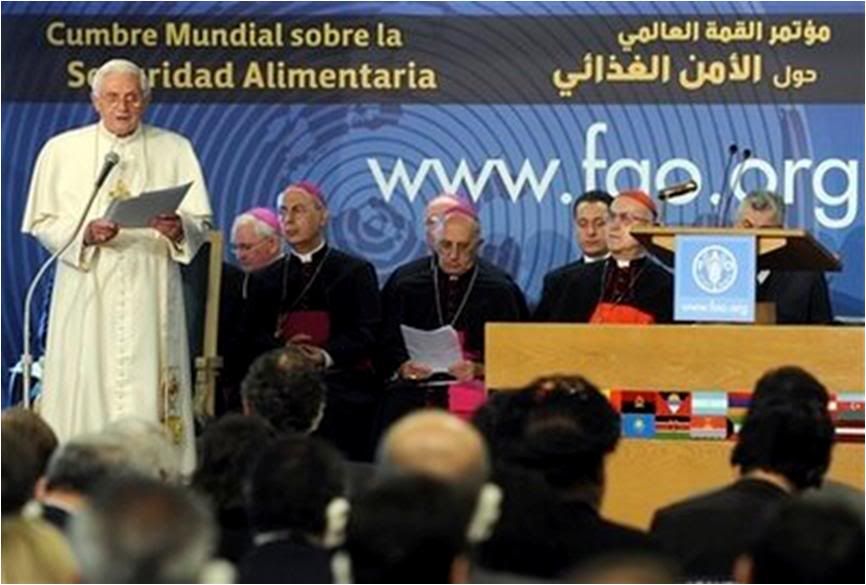
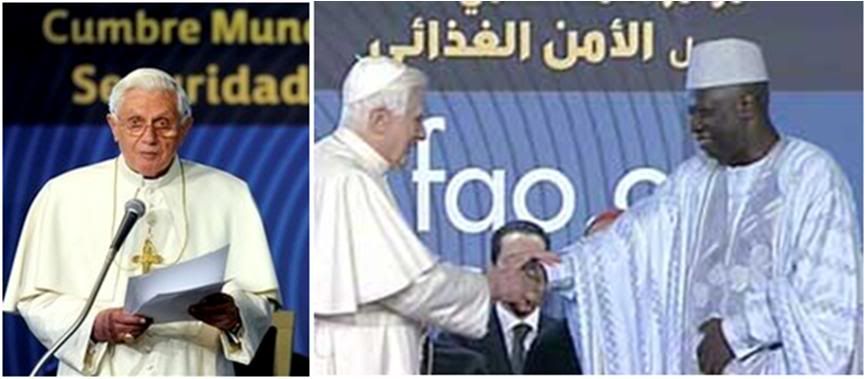
 I hate to profane this post with this snippet, which comes from an interview with Hans Kueng published in today's issue of Il Fatto Quotidiano, a new Italian daily, and brought to attention by Euge in Lella's blog. Here is the last question in the interview and Hans Kueng's answer.
Hans Kueng says the answer
I hate to profane this post with this snippet, which comes from an interview with Hans Kueng published in today's issue of Il Fatto Quotidiano, a new Italian daily, and brought to attention by Euge in Lella's blog. Here is the last question in the interview and Hans Kueng's answer.
Hans Kueng says the answer
to world hunger is the pill
Excerpted from an interview in

Nov. 16, 2009
Pope Benedict XVI is opening the FAO summit on food security. What do you expect the Pontiff to say?
Something about the unacceptable demographic explosion. The problem of hunger is to be fought with a policy of birth control. The pill is an efficient instrument to avoid population explosion. The Church cannot continue to demonize contraceptive methods.
Frankly, I was unaware of Kueng's attitude towards contraception before this, but I would not be surprised if he had been among the most vocal critics of Paul VI's Humanae Vitae.
Also, Kueng simply overlooks that the Church does not demonize all contraceptive methods - only artificial methods. Catholics who advocate the pill opt for convenience - since natural birth control based on knowledge of the woman's ovulatory pattern does involve the responsibility of abstaining from sex during her fertile period, whih generally means at most three days of the month. Is that such a big sacrifice? Generations of Catholic women did it before the pill was contrived!
[Modificato da TERESA BENEDETTA 16/11/2009 19:33] |
| |
 16/11/2009 19:32 16/11/2009 19:32 |
|
| | | OFFLINE | | Post: 18.879
Post: 1.527 | Registrato il: 28/08/2005
Registrato il: 20/01/2009 | Administratore | Utente Veteran | |
|
 Four hours since the Pope's address - and despite the fact that the English text was immediately made Available - the only English report so far comes from the German agency dpa, whose English translators generally are able to file papal stories before the Anglophone news agencies do.
Benedict XVI says:
Four hours since the Pope's address - and despite the fact that the English text was immediately made Available - the only English report so far comes from the German agency dpa, whose English translators generally are able to file papal stories before the Anglophone news agencies do.
Benedict XVI says:
Greed and speculation, not population growth,
are main causes of world hunger

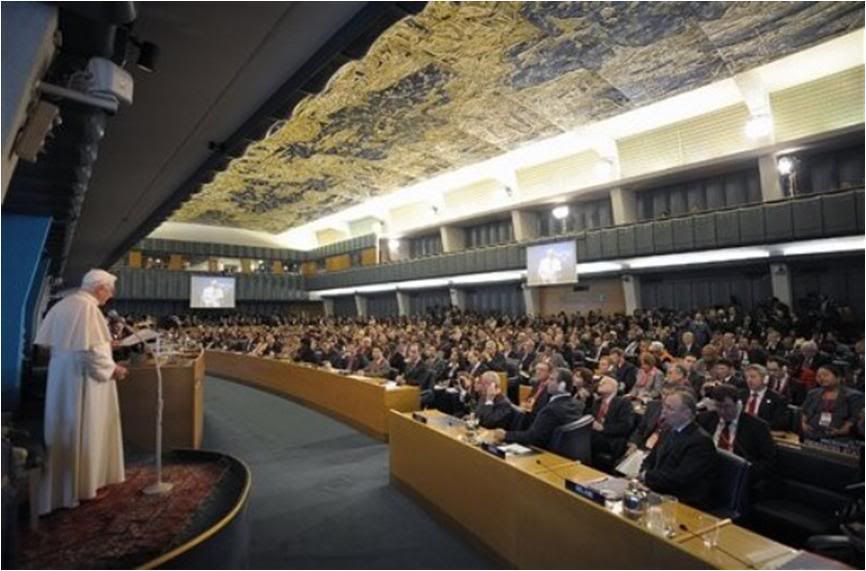
Rome, Nov. 16 (dpa) - Pope Benedict XVI on Monday implored rich nations to do more to eradicate world hunger, stressing that greed and speculation, and not population growth, are the main causes of hunger and poverty.
Benedict delivered the keynote speech at a three-day United Nations food summit in Rome which is being attended by some 60 heads of state and government.
Speaking in French, the German-born pontiff noted that statistics indicate the "earth can produce enough to feed all its inhabitants."
The absence of a cause-and-effect relation between hunger and population growth is proven by the "deplorable destruction of food for economic gain," the pontiff said.
He was apparently referring to the practice by some countries or agricultural sectors, mostly in developed nations, to eliminate their surplus production of food to keep prices up.
Benedict urged a reform of international economic relations and denounced the "greed which allows speculation, even in the cereal market, in which food is placed on an equal footing with other products.
"To combat and achieve victory over hunger it is essential to redefine the principles that to date have defined international relations," he said.
These should be based on human solidarity and its defining principle of "love," which cannot exist without the concept of "justice," the pontiff said.
Earlier UN Secretary General Ban Ki-moon opened the summit with a stark reminder of the plight affecting the world's hungry, and a warning that the situation will worsen unless harmful climate change is curbed.
"This day, more than 17,000 children will die of hunger. One every five seconds. Six million children a year," Ban told the gathering hosted by the UN Food and Agriculture Organization (FAO) at its Rome headquarters.
Ban also referred to a symbolic, personal fast he made Sunday ahead of he summit in an effort to draw attention to global hunger.
"It was not easy. But, for too many people, going without food is a daily reality," he said.
Libyan leader Moamer Gaddafi - who condemned the legacy of colonialism in Africa - and Egyptian President Hosny Mubarak were among participants who spoke on the opening day of the summit which ends Wednesday.
However, some critics, including development activists, are denouncing the absence from the summit of many leaders from the world's richest nations.
US President Barack Obama who is on an Asian tour is not scheduled to attend.
Indeed, the only government leader from the Group of Eight most- industrialized nations present on Monday was Italian Prime Minister Silvio Berlusconi. [As the host country's head of government, he is also presiding at the summit.]
A 70-per-cent increase in food production will be required by 2050 when the world's population which is forecast to top 9 billion, Ban told delegates.
He also stressed the connection between food security an climate change ahead of the international environment conference in Copenhagen in December, when world leaders will attempt to forge a new agreement to curb rising global temperature.
"If the glaciers of the Himalaya melt, it will affect the livelihoods and survival of 300 million people in China and up to a billion people throughout Asia," Ban warned.
Africa's small-scale farmers who produce most of the continent's food and depend mostly on rain could see their harvests cut by more than half by 2020 because of climate-change induced drought, Ban said.
The FAO says some 44 billion dollars - or 17 per cent of official development aid - needs to be directed annually towards agriculture and food production, if hunger is to be eradicated in developing countries.
In 2009 agriculture is expected to receive only 5 per cent of development aid, according to FAO Director-General Jacques Diouf who also addressed summit delegates on Monday.
The FAO hopes the summit will also secure urgent aid to some 31 poor countries particularly stricken by the global economic crisis and in a context where food prices remain high despite good world cereal production this year.
Especially hard hit is East Africa, where drought and conflict have left an estimated 20 million people in need of emergency food aid.
The FAO also advocates longer-term strategies that would allow millions of small-scale farmers to earn a livelihood again, including extending irrigation services, fertilizer supplies, and improved transport infrastructure such as roads, to allow agriculture products to reach markets.
Also, as usual, John Allen is able to file his report ahead of the Anglophone news agencies:
Facing hunger, Pope demands
an end to 'opulence and waste'

Nov. 16, 2009
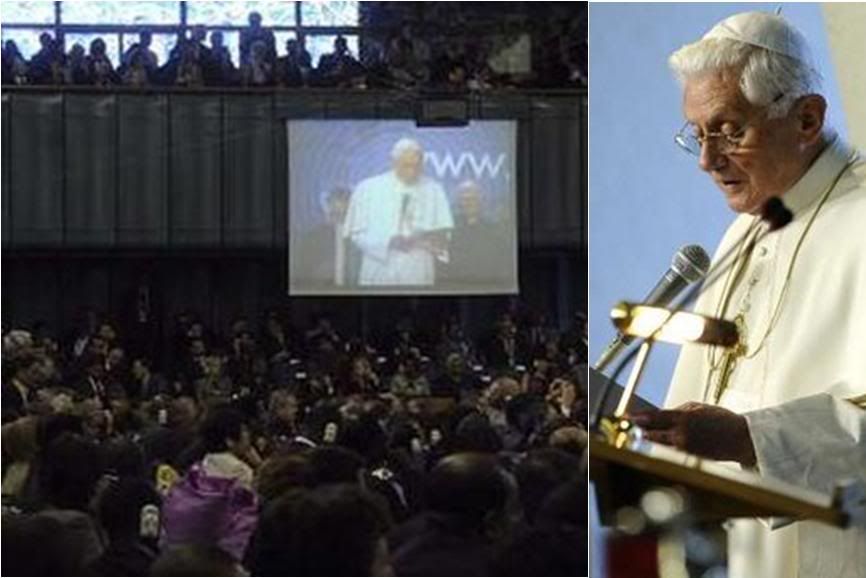
Calling hunger “the most cruel and concrete sign of poverty,” Pope Benedict XVI today told a special summit of the United Nations Food and Agriculture Organization that “opulence and waste are no longer acceptable when the tragedy of hunger is assuming ever greater proportions.”
The Pontiff called for urgent action to combat world hunger, to protect the global environment and to rethink lifestyle choices in the West in his address to the Food and Agriculture Organization, which is based in Rome.
Benedict’s decision to visit the Rome headquarters of FAO, rather than to insist that participants in the summit travel across town to the Vatican to be received in audience, was seen as a sign of the importance the Pontiff attaches both to the issue of hunger and to the institution of the United Nations.
According to statistics collected by FAO, the global economic crisis and a spike in food prices in parts of the developing world have driven the number of hungry people in the world from 800,000 five years ago to more than one billion today.
In his address to the FAO summit this morning, United Nations Secretary General Ban Ki Moon said that some 17,000 children die of hunger every day.
Speaking in French, Benedict XVI said the underlying problem isn’t a lack of food, echoing a point frequently made by development experts and anti-hunger activists.
“Sufficient food is produced on a global scale to satisfy both current demands and those in the foreseeable future,” the pope said. What’s missing, the Pope said, is instead “a network of economic institutions capable of guaranteeing regular access to sufficient food and water.”
In particular, Benedict insisted “there is no cause-and-effect relationship between population growth and hunger” – an indirect reply to critics of the church’s ban on contraception, which is sometimes blamed for impeding efforts to limit population growth.
The Pontiff asserted that “food and access to water” [are] “universal rights of all human beings, without distinction or discrimination.” Those rights, the Pope argued, take on meaning as part of a network of rights “beginning with the primary one, the right to life.”
Benedict asserted a clear link between hunger and environmental degradation.
“Protection of the environment challenges the modern world to guarantee a harmonious form of development, respectful of the design of God’s creation and therefore capable of safeguarding the planet,” the pope said.
“The links between environmental security and the disturbing phenomenon of climate change need to be explored further,” Benedict said, “focusing on the central importance of the human person, and especially of the populations most at risk from both phenomena.”
The Pope also called for a change in lifestyles in rich countries, in the direction of greater simplicity, less conspicuous consumption, and more solidarity with the poor.
“Norms, legislation, development plans and investments are not enough,” he said. “What is needed is a change in the lifestyles of individuals and communities, in habits of consumption and in perceptions of what is genuinely needed.”
Insisting that feeding hungry people is a moral imperative that “brooks neither delay nor compromise,” the Pontiff pledged that “the Catholic Church will always be concerned for efforts to defeat hunger.”
Despite the Pope’s strong words, the FAO summit does not appear likely to approve any new financial commitment from developed nations to attack hunger. Instead, the summit endorsed a five-point program this morning calling for greater “national, regional and global coordination” of anti-hunger resources.
Given that hunger tends to be especially acute in the global South, it’s an issue destined to attract a growing share of Catholic interest. Of the roughly 1.2 billion Catholics in the world today, some 720 million, or two-thirds, live in the southern hemisphere, making hunger a top-shelf pastoral priority for Catholic bishops, clergy and lay activists in those regions of the world.
If only all the climate-change breastbeaters paid a fraction of their lip service - and investment - in meaningful ways to combat world hunger as they do to bringing down greenhouse gases RIGHT NOW, without the cooperation of the world's two most populous nations!
The AP report includes an important substantive vote taken by the summit before the Pope even spoke:
Food summit turns down
UN funding appeal
By FRANCES D'EMILIO

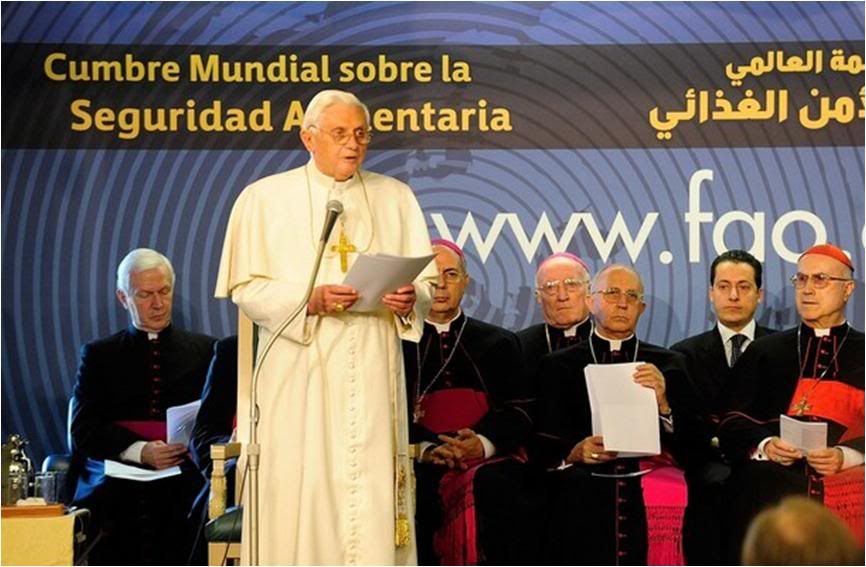
ROME, Nov. 16 (AP) – Pope Benedict XVI decried the worsening plight of the world's 1 billion hungry on Monday, as a United Nations food summit rallied around a strategy of more help to farmers in poor nations but rebuffed a U.N. appeal to commit billions to the plan.
In a show of broad consensus, some 60 heads of state and dozens of ministers from other nations pledged to substantially increase aid to agriculture in developing nations to help them become more self-sufficient in food production.
The world's wealthiest nations put forward the strategy at the Group of Eight summit this summer in L'Aquila, Italy.
Despite endorsing the strategy in the first hours of Monday's meeting, the 192 participating countries did not commit to the $44 billion a year for agricultural aid that the U.N. Food and Agriculture Organization says will be necessary in the coming decades.
Soon after the delegates approved the declaration, Pope Benedict took the floor to decry "opulence and waste" in a world where the "tragedy" of hunger has been steadily worsening.
Benedict's speech marked the first time a Pontiff attended such a gathering since Pope John Paul II took part in a 1996 food summit.
The Pontiff, lending his moral authority as head of the world's 1 billion Catholics, also called for access to international markets for products coming from the poorest countries, which he said are often relegated to the sidelines.
The Pope urged delegates to keep the "fundamental rights of the individual" in mind when shaping new agricultural strategy. People are entitled to "sufficient, health and nutritious food" as well as water, he said.
Heads of state in attendance include Brazil's President Luiz Inacio Lula da Silva to Libyan leader Moammar Gadhafi. The U.S. delegation is headed by the acting administrator of the U.S. Agency for International Development Alonzo Fulgham.
The U.N. agency, which is hosting the three-day summit at its Rome headquarters, had also hoped countries would adopt 2025 as a deadline to eradicate hunger. But the declaration instead focused on a pledge set nine years ago to halve the number of hungry people by 2015.
As the conference opened, the United Nations' chief urged rich and powerful countries to tackle "unacceptable" global hunger.
"The world has more than enough food," U.N. Secretary-General Ban Ki-moon told delegates. "Yet, today, more than 1 billion people are hungry. This is unacceptable."
So far, helping the world's hungry has largely entailed wealthy nations sending food assistance rather than technology, irrigation help, fertilizer or high-yield seed that could assist local farmers, livestock herders and fishermen. Much of this food assistance is purchased from the wealthy nations' own farmers.
But the Food and Agriculture Organization says the best way to stop hunger is to help the needy help themselves, and the final declaration agreed to do that.
This approach "lies at the core of food security," Ban said. "Our job is not just to feed the hungry, but to empower the hungry to feed themselves."
The summit is being held at a time "when the international community recognizes it has neglected agriculture for many years," the organization said Sunday. "Sustained investment in agriculture — especially small-holder agriculture — is acknowledged as the key to food security."
The gathering hopes to build momentum on a shift toward more aid to agriculture that was first laid out at the G-8 summit in July, during which leaders of the developed nations pledged to spend $20 billion in the next three years to help farmers in poor countries.
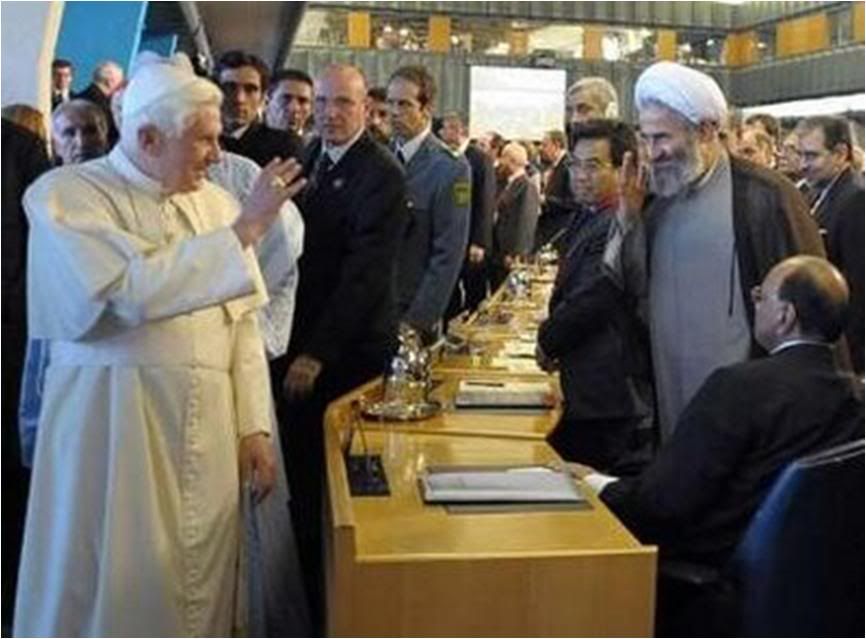
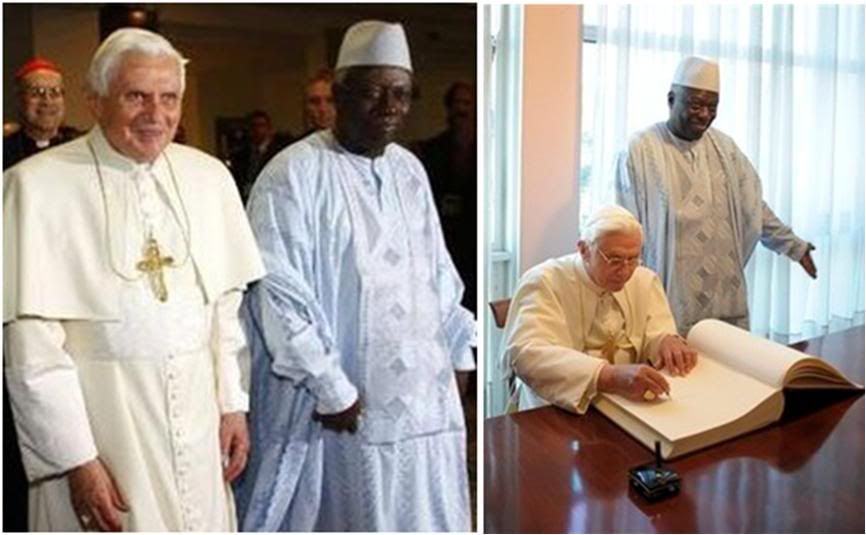
|
| |
 16/11/2009 21:22 16/11/2009 21:22 |
|
| | | OFFLINE | | Post: 18.880
Post: 1.528 | Registrato il: 28/08/2005
Registrato il: 20/01/2009 | Administratore | Utente Veteran | |
|


 Papal and Church communications:
Papal and Church communications:
How effective are they?
by Salvatore Izzo

VATICAN CITY, Nov. 16 (Translated from AGI) - "Those engaged in religious information and communications must have a solid cultural background [not to mention some solid preparation for covering the beat]", says Don Giuseppe Costa, director of the Vatican publishing house LEV and professor of journalism at the Pontifical Salesian University in Rome, in the new book Editoria, media e religione(Publishing, media and religion) on the great publishing success registered by Pope Benedict XVI, without ignoring the media difficulties that have been encountered by his Pontificate.
Thirty international editions with more than 3 million copies sold to date of the Pope's JESUS OF NAZARTH (Vol. 1) would appear to show that the public does not share the secular media's under-estimation of the Pope's communicative abilities, Fr. Costa says.
The new book, published by LEV, contains essays by a dozen communications specialists who describe, explain and analyze the relationship between mass communications today and 'the religious fact'.
Among the essayists is Angelo Paoluzi, former editor of Avvenire and the news agency Fides, who explains the role and task of Vatican correspondents. He recalls with nostalgia Corriere della Sera's correspondent Silvio Negro, who distinguished himself by great balance in reporting the news and resisting the temptation to indulge in 'behind-the-scenes' speculation, and was guided only by "public interest in the life of the Church as an institution".
Sr. Maria Trigilia, a Salesian media expert, confirms the renewed public interest in the Church, in a report on the boom in
Catholic web sites and following.
Since June 1997, more than 500,000 Catholic web pages are now consulted every month in Italy alone, where there are 2391 parish pages, followed by associations (2067), religious orders and missionary institutes (1222).
There are now 627 institutional sites (CEI, dioceses and diocesan pastoral work), 589 blogs, 403 sites linked to cultural centers and universities, and 353 media sites for print information. All these sites for Catholic information have registered a 25% increase yearly in the past two years.
Even faster however is the growth in sites dedicated to Christian music *33.6%), Catholic TV and radio sites (32.8%), and sacred art (31.5%).
"The Internet," says Sr. Trigilia, "does not just meet the 'spiritual' demands of the cyberfaithful, but also the demands of a growing market with increasingly greater customer turnout and specialized interests. For instance, one can now study sacred texts online, along with the necessary philological and theological references. There are now numerous sites offering resources for such study of the Bible, the Koran, Buddhist and Hindu texts".
She also points out the presence of 'church locator' sites which can enable anyone to locate the nearest church or place of worship for his/her needs. There are even Christian 'churches' that only operate online, so-called 'Internet churches', that one can attend by the mere click of the mouse.
The LEV book also has an essay about the Innernet (www.innernet.it) - a non-profit initiative devoted to "disseminating profound and useful knowledge for all those who are engaged in researching a richer interior life".
The site, which gets millions of hits, now has 418 ongoing active topics with some 19,000 presentations, quite apart from users' comments (845,460 so far). The presentations consist of articles, essays, interviews and book reviews on topics ranging from techniques of meditation and interior exploration, to teachings by 'consciousness masters', to the relationship between psychology and the spirit, passing through discussions on conscience and its conscious application to social and political issues (human rights, peace, ecology, etc).
['Innernet'? I'll pass. Thank God I do not have to search out or visit any site other than those that I need to consult immediately (and for the least time possible) for basic information, fact check or images. So far, I've only had to seek out specialized information on medical topics on which I need to draft specific lectures - and oh yes, on Joseph Ratzinger. I don't expect to have the time nor the inclination to do more than that.]
[Modificato da TERESA BENEDETTA 16/11/2009 21:25] |
| |
 17/11/2009 12:12 17/11/2009 12:12 |
|
| | | OFFLINE | | Post: 18.882
Post: 1.530 | Registrato il: 28/08/2005
Registrato il: 20/01/2009 | Administratore | Utente Veteran | |
|
 Tuesday, Nov. 17
Tuesday, Nov. 17
 ST. ELIZABETH OF HUNGARY (b Hungary 1207, d. Germany 1231)
ST. ELIZABETH OF HUNGARY (b Hungary 1207, d. Germany 1231)
[St. Elizabeth of Thuringia]
Princess of Hungary, Queen of Thuringia, mother of three, widow at 21,
she has been described as "one of the most pious women to ever live...
who made more of an impact on an entire country then most people who
live three times as long as she did". Married to Ludwig of Thuringia
at 14, he allowed her to use royal resources for her charities and is
locally venerated as a saint himself even if he was never canonized.
Their third child was born after Ludwig was killed as he set out for
the Sixth Crusade. She was devastated by his death and joined the
Franciscan third order. Venerated for her life of prayer, sacrifice
and service, she was canonized just four years after her death.
OR for 11/16-11/17:
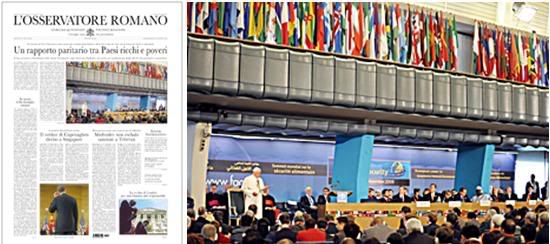
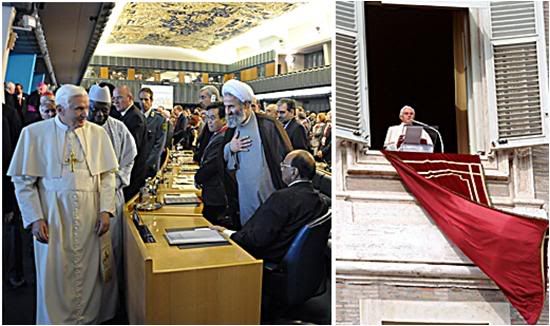
In his address to FAO, the Pope asks that the battle against hunger not be reined in
by delays or compromises:
'A relationship of parity between rich and poor nations
requires not just laws but a change of personal and social lifestyles'
Other Page 1 stories: An editorial on the FAO food summit; the Holy Father's Angelus homily on
the Word of God; Asia-Pacific nations including the US accept there will be no consensus other
than intention at the Copenhagen climate-change summit next month; Russia's Medvedev hints
once more at possibility of joining sanctions against Iran. In the inside pages is a report that
the Orthodox Patriarch Pavle (Paul) of Serbia died yesterday at age 95.
No events scheduled for the Holy Father today.
|
| |
 17/11/2009 13:06 17/11/2009 13:06 |
|
| | | OFFLINE | | Post: 18.883
Post: 1.531 | Registrato il: 28/08/2005
Registrato il: 20/01/2009 | Administratore | Utente Veteran | |
|

 In the name of the human family
In the name of the human family
Editorial
by Giovanni Maria Vian
Translated from
the 11/16-11/17/09 issue of

A clear and realistic denunciation of an intolerable situation: The number of those who suffer from hunger is growing, but no one is really paying attention.
Benedict XVI spoke in these terms to the Food and Agriculture Organization of the United Nations at a world summit on food security, in an address, for which one may reasonably expect interest and concrete answers, for an authority whom large numbers of people in every part of the planet, even outside the Catholic Church, look to with confidence.
In continuity with the encyclical Caritas in veritate and with the teaching of his predecessors, the Pope reiterated that the tragedy of poverty - of which "hunger is the most cruel and concrete sign" - is not due to population growth, and that this is objective fact which is denied only for ideological reasons and in the defense of special interests and privileges.
Paul VI had said so in his two sister encyclicals in defense of human life ( Populorum progressio and Humanae vitae), John Paul II said so many times, and today their successor says so, reinforced by a consensus that is starting to spread even among international organizations.
The Pope's address merits attention because it is realistic. Above all, it challenges civilian authorities and elements of the international community. It does so with a lucid analysis that sees "the weakness of present mechanisms for food security" and suggests changes.
He did so in the name of the Catholic Church - as Paul VI did when, for the first time, a Pope spoke before representatives of all the peoples of the earth - and without presuming to interfere in political choices.
In the name, therefore, of a global reality and a concern to defend every human being. The criterion of "common belonging to the universal human family", Benedict XVI underscored, is the only one required to justify asking "every people, and therefore, every nation, to be fraternal".
it is an appeal to reason which urgently calls for a change in the international agenda and its concrete political choices: to put an end to the scandalous destruction of food surpluses; to modify the mechanisms for international aid and cooperation; to redesign the relationships among nations; to pay attention to the rural world; and to safeguard the environment.
One may well ask if Benedict XVI's lucid and concrete arguments will be heeded, if his words will be taken into consideration. Many will doubtless ignore them - and in this, the role of international media is fundamental - and others will revert to stereotypes about a Church that remains obscurantist in the face of a supposed global over-population.
But it won't be easy for these critics: the Pope has said that the Church "respects the knowledge and the results of science, as it does those choices that are made with reason". It is in the name of reason, as well as faith, that he speaks.
Avvenire's editorial is more concrete:
The courage to dare
for a suffering humanity
Editorial
by Giulio Albanese
Translated from

Nov. 17, 2009
It is really such a shame that yesteray, on the opening day of the FAO summit on world food security, most of the leaders from the so-called First World were absent.
If only because they missed listening directly to Benedict XVI and his truly illuminating lecture on integral human development in the sign of Christian hope.
Indeed, what the Holy Father emphasized, in effect, was that it is useless to continue issuing appeals now and then about the hunger crisis that now affects more than a billion persons, illustrated with cold figures of those who die from hunger and pandemic disease, as though all these deaths were ineluctable.
The Pontiff's statement is very relevant, especially since it is evident that international institutions lack the political will to pay serious attention to such a grave crisis - a very grave one with global consequences - for which the Church Magisterium has not failed to suggest practical measures.
The possibility of conquering hunger in the world - the very reason for which the nth world summit has been convoked in Rome - must begin with a redefinition of the 'concepts' and 'principles' that have till now defined international relationships, particularly those between the world's North and South, the Pope states.
And he referred to his encylical Caritas in veritate, which states unequivocally that "hunger does not depend so much on material scarcity, as from the lack of social resources, the most important of which are necessarily institutional in nature".
This underscores the lack of economic institutions, sustained by political will, that are able to eliminate the 'structural' causes that generate famine and thus, to promote concrete affirmation of the common good.
For example, it is futile to think of conquering hunger if the aid-giving nations continue to provide subsidies that seriously damage the agricultural sector in poorer nations, or if food policies are merely oriented towards consumer needs while favoring speculation in the price of staple grains, and food ceases to be a right but a commercial pawn like any other merchandise.
Moreover, in an era of the market, of currency and globalization, what is left for those whose basic problem is their very survival?
That is why it is urgent to reaffirm the evangelical precept of love for neighbor, coupling every form of cooperation - understood, in fact, as fraternal expression - with the priciple of subsidiarity.
All this, with the awareness that communities afflicted by poverty should become players in their own rescue, participating in the use of the aid received from others, especially in terms of applying new knowledge while respecting the environment, because this will guarantee the sustainability of such aid.
Benedict XVI did not fail to underscore that recognition of human dignity, based on the transcendent value of each person created in the image and likeness of God, remains the first step towards eradicating poverty in all its forms.
Hence, it is not merely a question of benevolence towards suffering humanity, but rather of affiming planetary justice. One recalls the unforgettable verse by the Mexican poet Salvador Diaz Miron: "Know this, sovereigns and vassals, eminences and mendicants, no one has the right to excess as long as a single person lacks the necessary".
If we want a better world, one needs the courage to dare: to say and testify actively to the Gospel values, in order to combat injustice, hatred, war, hunger, poverty, and ultimately, human selfishness.
In this respect, the fact that the world now spends more than a trillion dollars annually on armaments speaks eloquently. [While the FAO asks only for $44 billion this year to help the hungry.]
OR today also published the text of Director-General Jacques Diouf's remarks to introduce the Holy Father at the FAO summit yesterday:
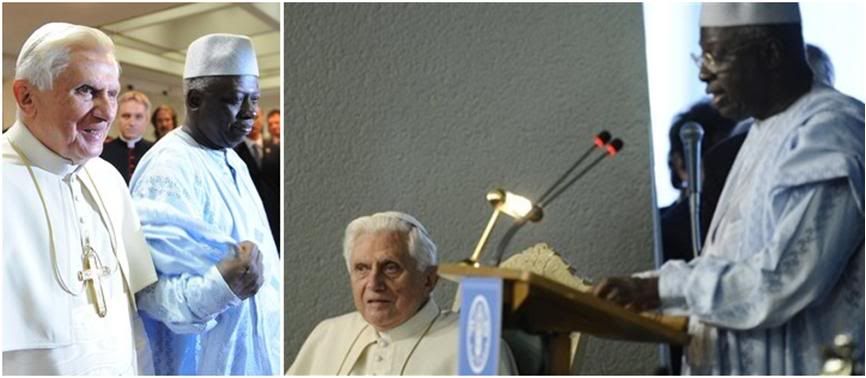 The tragedy of hunger
The tragedy of hunger
is above all a moral problem
by Jacques Diouf
Director-General of FAO
Translated from
the 11/16-11/17/09 issue of

Your Holiness,
Your Majesty,
Eminences,
Excellencies,
Ladies and Gentlemen:
The presence of Your Holiness this morning at FAO, on the occasion of the world summit of heads of state and government on food security, is an exceptional event.
I must thank you sincerely, personally and in the name of all the participants, for having accepted to share with us your concerns and hope in the face of a world food insecurity.
Your presence this morning among us confers on this summit a strong spiritual dimension to face the problem of hunger in the world.
The tragedy of malnutrition and famine which daily kills thousands of children, men and women is above all a moral problem.
Of all the sufferings that the world knows today, hunger is the most tragic and the most intolerable, even if it is not always the most mediatic.
Any commitment to justice and peace in this world is inseparable from the urgency of making progress in the realization of the right to alimentation for everybody.
Your words and your presence this morning at FAO, Holiness, will demonstrate, if it is at all needed, the consonance of views between the Catholic Church and FAO on this fundamental question.
The Church has always given herself the task of alleviating the poverty of the neediest, and the motto of FAO is 'Fiat panis' - Let there be bread - which means bread for all.
Holiness, I hope that beyond the political messages which will be made in the course of the summit, your presence will allow the battle against hunger to be brought to a level of collective responsibility and ethics which transcend the stakes of national and regional interests, in order to reaffirm in a clear and firm voice the right to alimentation, first among the rights of man.
Thank you.
[Modificato da TERESA BENEDETTA 18/11/2009 02:11] |
| |
 17/11/2009 15:29 17/11/2009 15:29 |
|
| | | OFFLINE | | Post: 18.885
Post: 1.533 | Registrato il: 28/08/2005
Registrato il: 20/01/2009 | Administratore | Utente Veteran | |
|
 Pope's message to 'Propaganda Fide'
Pope's message to 'Propaganda Fide'
on their current plenary assembly
 Translated from
Translated from
the 11/16-11/7/09 issue of

To my Venerated Brother
Cardinal Ivan Dias
Prefect of the Congregation
for the Evangelization of Peoples
On the occasion of the Plenary Assembly of the Congregation for the Evangelization of Peoples, I wish to address to you, dear Cardinal, my heartfelt greeting which I gladly extend to the Cardinals, Archbishops, Bishops and all those who are taking part in it. I also greet the Secretary, the Associate Secretary, the Undersecretary and all the workers of this dicastery.
In doing so, I also express my appreciation and gratitude for the service that you render to the Church in its missione ad gentes.
The theme of your assembly, "St. Paul and the new Areopagi", in the light of the recently concluded Pauline Year, helps us relive the experiences of the Apostle to the Gentiles when in Athens, he proclaimed the Gospel using a language that was 'inculturated', as we would say today (cfr Acts 17,22-31).
That Areopagus, which at the time represented the cultural center for the educated Athenians, can today - as my venerated predecessor John Paul II said - "be taken as a symbol of the new places in which the Gospel should be proclaimed" (Redemptoris missio, 37).
Indeed, reference to that Pauline event constitutes a pressing invitation to learn to appreciate today's areopagi where one must confront the great challenges of evangelization.
You will be analyzing this topic with realism, taking into account many social changes that have taken place. This realism will be sustained by the spirit of faith, which sees history in the light of the Gospel, and by the certainty that St. Paul had in the presence of the Risen Christ.
The words that Jesus addressed to him in [a vision in] Corinth still resound today: "Do not be afraid. Go on speaking, and do not be silent, for I am with you. No one will attack and harm you" (Acts 18,9-10).
The Servant of God Paul VI used to say that it does not only mean preaching the Gospel but "to reach and almost to turn around by the power of the Gospel the criteria for justice, the determining values, the points of interest, the lines of thought, the inspirational sources and life models of mankind which go against the Word of God and the plan for salvation" (Insegnamenti xiii, 1975, p. 1448).
We must look at the new areopagi in that spirit: some of them, in the present globalization, have become common and universal, while others remain particular to a continent, as we saw in the recent Special Assembly for Africa of the Bishops' Synod.
The missionary activity of the Church must be oriented towards these nerve centers of society in the third millennium. It must not under-estimate the influence of a widespread relativistic culture, most of the time deficient in values, which has entered the shrine of the family, infiltrated into the field of education, contaminating other sectors of society, manipulating consciousness, especially that of the young.
At the same time, however, despite these snares, the Church knows that the Holy Spirit is always active. Indeed, new doors are opening to the Gospel, and a yearning for authentic spiritual and apostolic renewal is spreading in the world.
As in other times of change, the pastoral priority is to show the true Face of Christ, Lord of history and man's only Redeemer. This demands that each Christian community and the Church as a whole offer a testimony of fidelity to Christ, patiently constructing the unity he desired and invoked for all his disciples.
In fact, the unity of Christians will make evangelization easier, as well as the task of facing the cultural, social and religious challenges of our time.
In our missionary undertaking, we can look to the apostle Paul, and imitate his 'lifestyle' and his apostolic spirit that was totally centered on Christ.
With such complete adherence to the Lord, Christians can more easily transmit to future generations the legacy of faith, capable of transforming even the difficulties possible in evangelization.
In the recent encyclical Caritas in veritate, I underscored that the economic and social development of contemporary society requires recovering attention to the spiritual life - "a serious consideration of the experiences of trust in God, spiritual fellowship in Christ, reliance upon God's providence and mercy, love and forgiveness, self-denial, acceptance of others, justice and peace... Christians long for the entire human family to call upon God as “Our Father!”(No. 79).
Your Eminence, as I give thanks for the service which this dicastery renders to the cause of the Gospel, I invoke on you and all those who are taking part in this Plenary Assembly the help of God and the protection of the Virgin Mary, Star of Evangelization, and from the heart, I impart to all my blessing.
From the Vatican
November 13, 2009

[Modificato da TERESA BENEDETTA 17/11/2009 15:31] |
| |
 17/11/2009 16:53 17/11/2009 16:53 |
|
| | | OFFLINE | | Post: 18.886
Post: 1.534 | Registrato il: 28/08/2005
Registrato il: 20/01/2009 | Administratore | Utente Veteran | |
|

 Saints' congregation approves
Saints' congregation approves
'heroic virtues' of John Paul II:
Next step - Pope proclaims him 'Venerable'
by Salvatore Izzo

VATICAN CITY, Nov. 17 (Translated from AGI) - The cardinals and bishops of the Congregation for the Causes of Sainthood voted yesterday in favor of postulating the 'heroic virtues' of Karol Wojtyla/John Paul II.
There was no official announcement because the vote is considered 'consultative' and requires confirmation and announcement by the Pope.
However, the Vatican did not deny reports made by Vatican correspondents Andrea Tornielli and Marco Tossatti in their respective blogs and by Franca Giansoldati in Il Messaggero.
Previously, theologian consultants to the Congregation had approved the positio.
When he decrees the late Pope's 'heroic virtues', Benedict XVI will also declare him 'Venerable', thus paving the way for the last stage of the beatification process, namely, the verification by a medical commission and confirmation by a theological commission of a post-mortem miracle attributed to John Paul II.
The case to be verified is that of a French nun who was cured overnight of Parkinson's disease in 2005, after praying to the late Pope for his intercession.
Once the miracle is verified by the doctors and approved by the theologians as an event that cannot be explained by natural causes, the members of the Congregation will vote for beatification and recommend the cause to the Pope.
Recently, Cardinal Tarcisio Bertone, responding to newsmen, said that there would be no 'acceleration' of the beatification process other than the waiver granted by Benedict XVI in May 2005 of the customary five-year-period following death before a formal cause for beatification could be started.
It is unlikely that the process will be completed by the time of the late Pope's fifth death anniversary in April 2010, but it is possible it could be done by October 2010: October 16 is the anniversary of John Paul II's election as Pope, and the following day, Sunday, would be appropriate and timely for the formal beatification rites. It would also take place during the Special Synodal Assembly for the Middle East.
[Modificato da TERESA BENEDETTA 17/11/2009 16:54] |
| |
 17/11/2009 21:45 17/11/2009 21:45 |
|
| | | OFFLINE | | Post: 18.889
Post: 1.537 | Registrato il: 28/08/2005
Registrato il: 20/01/2009 | Administratore | Utente Veteran | |
|

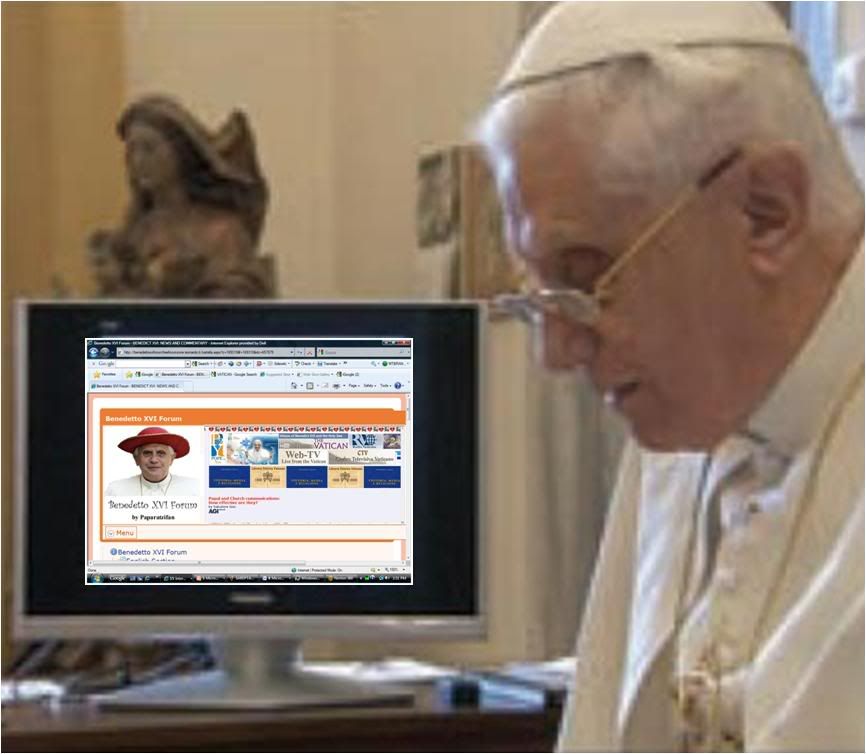
What if.....
|
| |
 18/11/2009 00:26 18/11/2009 00:26 |
|
| | | OFFLINE | | Post: 18.892
Post: 1.540 | Registrato il: 28/08/2005
Registrato il: 20/01/2009 | Administratore | Utente Veteran | |
|

 A surprising item from America magazine and particularly from thw writer who in the past year has produced a number of clunkers andpratfalls much fisked in the Catholic 'orthodox' blogosphere. Though the title is rather clunky itself and infelicitous even if it is meant to be positive.... Why not just say 'The luminosity of Pope Benedict', for instance?... Still, I am thankful to Mr. Winters for having had this insight!
The anti-shadow of Pope Benedict
A surprising item from America magazine and particularly from thw writer who in the past year has produced a number of clunkers andpratfalls much fisked in the Catholic 'orthodox' blogosphere. Though the title is rather clunky itself and infelicitous even if it is meant to be positive.... Why not just say 'The luminosity of Pope Benedict', for instance?... Still, I am thankful to Mr. Winters for having had this insight!
The anti-shadow of Pope Benedict
BY Michael Sean Winters

Nov. 17, 2009
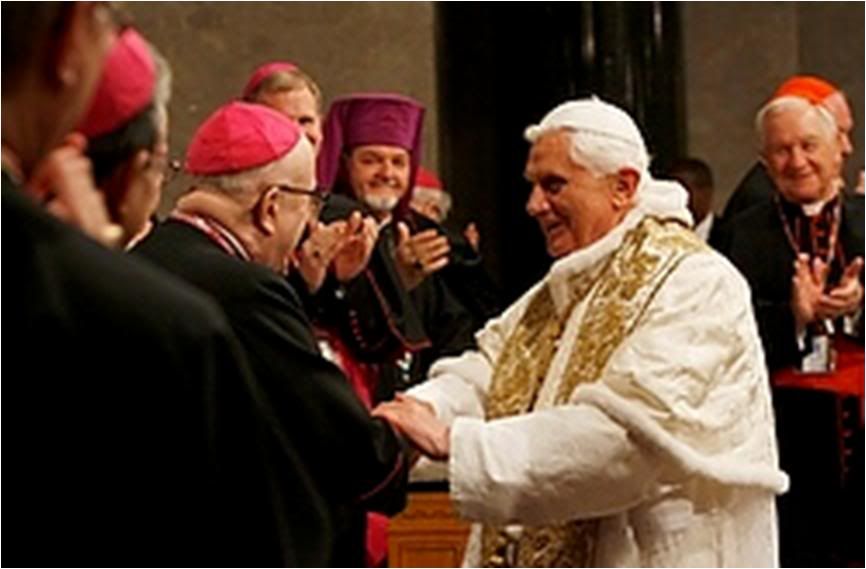 Pope Benedict with the US bishops in Washington DC last April 2005.
Pope Benedict with the US bishops in Washington DC last April 2005.
The shadow of Pope Benedict XVI was everywhere apparent at the first day of the USCCB meeting. Except that it is not a shadow at all. A shadow obscures the light, making it more difficult to see.
The dominant theme of the meeting so far is entirely positive, echoing the Holy Father’s insistence that the Church must proclaim what it is for, not just what it is against.
The opening sentences of the bishops’ statement on the health care reform debate read, "The US House of Representatives advanced major legislation to provide adequate and affordable health care to all. The Catholic Bishops of the United States have long advocated that adequate health care be made available to everyone."
They go on to voice their continued concern that health care reform not be used to extend abortion coverage, and they seem confidant that thevictory they achieved in the House can survive in the Senate.
In his presidential address, Cardinal Francis George said, "Relations do not speak first of control but of love. If there is a loosening of relationship between ourselves and those whom Christ has given us to govern in love, it is for us to reach out and re-establish conditions necessary for all to remain in communion."
In his address to the bishops, papal nuncio Archbishop Peitro Sambi reiterated the need for the Church to articulate a positive, compelling vision for the flock and for the broader culture.
Father David O’Connell, the President of the Catholic University of America, gave his last address to the bishops as president of their university: O’Connell earlier announced that he is stepping down as president of the bishops’ own university next summer.
Nowhere is the need to articulate a positive vision for the Church in the culture more evident than at a Catholic University, and few university administrators have done more than O’Connell to meet that need.
During O’Connell’s tenure, CUA focused on the Catholic identity of the institution. He has sponsored a variety of symposia, including one last month commemorating the "Year for Priests," the only such university symposium on the subject in America. He revamped the campus chaplaincy, making it a more integral part of campus life.
O’Connell kept a tight rein on the extension of invitations to outside speakers, shunning any who disagreed publicly with the Church’s core teachings, avoiding the kind of controversies that usually shed more darkness than light on the role of the Church in society.
On the other hand, he was frequently targeted by right wing critics for sponsoring such cultural events as a performance of Leonard Bernstein’s rock opera "Mass." But, if a Catholic University is not the right and proper place at which to perform such cultural gems, what is?
The shadow under which the Church in America has labored for too long is the negative view of human nature and, consequently, of human culture, that is a hallmark of Calvinism.
The Catholic Church has always fluctuated between adapting cultural norms and finding its own Catholic identity. Pope Benedict XVI has invited the Church to see its role differently from that of a scold. At the meeting this week in Baltimore, his invitation has been accepted.
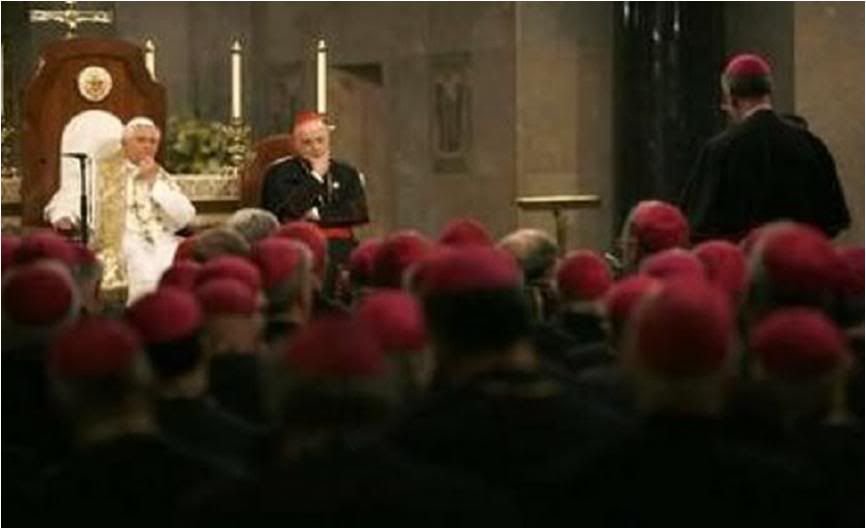
[Modificato da TERESA BENEDETTA 18/11/2009 01:04] |
| |
 18/11/2009 12:38 18/11/2009 12:38 |
|
| | | OFFLINE | | Post: 18.893
Post: 1.541 | Registrato il: 28/08/2005
Registrato il: 20/01/2009 | Administratore | Utente Veteran | |
|
 Wednesday, Nov. 18
Wednesday, Nov. 18
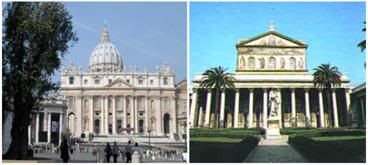 DEDICATION OF THE BASILICAS OF ST. PETER AND ST. PAUL IN ROME
DEDICATION OF THE BASILICAS OF ST. PETER AND ST. PAUL IN ROME
The Church of Rome celebrates the dedication of its four papal basilicas -
Santa Maria Maggiore on August 5, San Giovanni in Laterano on Nov. 9,
and San Pietro and San Paolo fuori le Mura jointly on Nov, 19.
The basilicas dedicated to the Apostles of Rome were each built over
the sites where they were martyred and buried. The original Basilicas
on the sites were built by the Emperor Constantine.
St John Chrysostom's words on the Apostles' tombs:
______________________________________________________________________________
"The sepulchres of those who have served Christ crucified surpass the palaces of kings;
not so much in the greatness and beauty of the buildings (though in this also they go
beyond them) as in other things of more importance, such as the multitude of those who go
with devotion and joy repair to them. For the emperor himself, clothed in purple, goes
to the tombs of the saints and kisses them; humbly prostrate on the ground he beseeches
the same saints to pray to God for him ; and he who wears a royal crown looks on it as
a great privilege from God that a tentmaker and a fisherman, and these dead, should be
his protectors and defenders, and for this he begs with great earnestness."
__________________________________________________________
OR today.
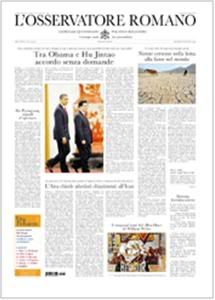
No papal stories in this issue. A front-page editorial criticizes failure of FAO
summit leaders to set fixed commitments in the war against hunger; a story
on the joint news conference by President Obama and China's Hu Jintao, at
which the media were not allowed to ask any questions [the OR story, relying
on the news agencies, chooses to report only what Obama said]; the IAEA
wants to know if Iran has any more secret nuclear sites; and a teaser on four
articles inside to mark the 50th anniversary of William Wyler's film
'Ben Hur'.
THE POPE'S DAY
General Audience at the Aula Paolo VI - The Holy Father spoke about
Romanesque and Gothic art in the Middle Ages.
After the audience, he met with
- H.E. Madame Sheikh Hasina, Prime Minister of Bangladesh, and her delegation
- Bishops of Brazil (South Sector-1, Group 5) on ad-limina visit
In the afternoon, he met with
- H.E. Pierre Nkurunziza, President of Burundi
[Modificato da TERESA BENEDETTA 19/11/2009 01:06] |
| |
 18/11/2009 15:16 18/11/2009 15:16 |
|
| | | OFFLINE | | Post: 18.894
Post: 1.542 | Registrato il: 28/08/2005
Registrato il: 20/01/2009 | Administratore | Utente Veteran | |
|
 GENERAL AUDIENCE TODAY
GENERAL AUDIENCE TODAY
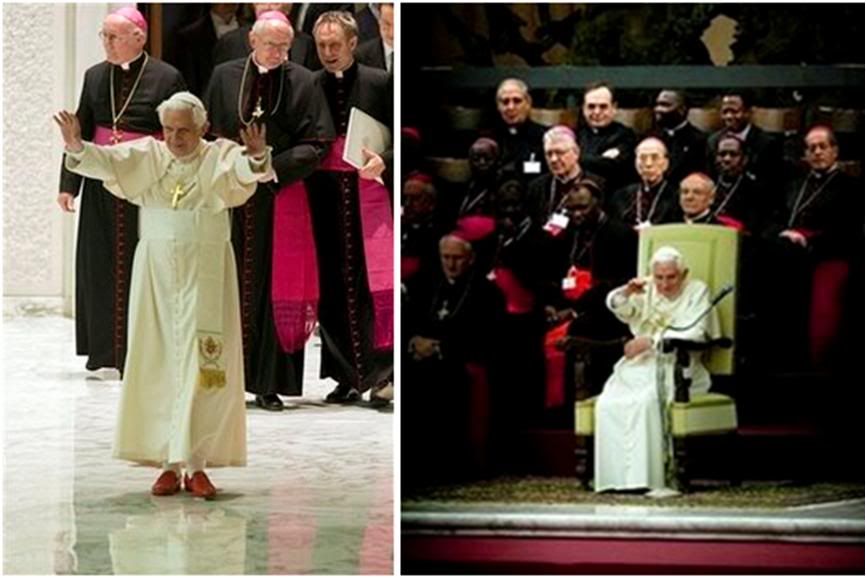 Different onstage configuration today: attending prelates grouped around the Pope rather than seated off to the sides. Judging by the number of cardinals present, the group could be the plenary membership of the Congregation for the Evangelization of Peoples meeting this week in Rome.
Different onstage configuration today: attending prelates grouped around the Pope rather than seated off to the sides. Judging by the number of cardinals present, the group could be the plenary membership of the Congregation for the Evangelization of Peoples meeting this week in Rome.
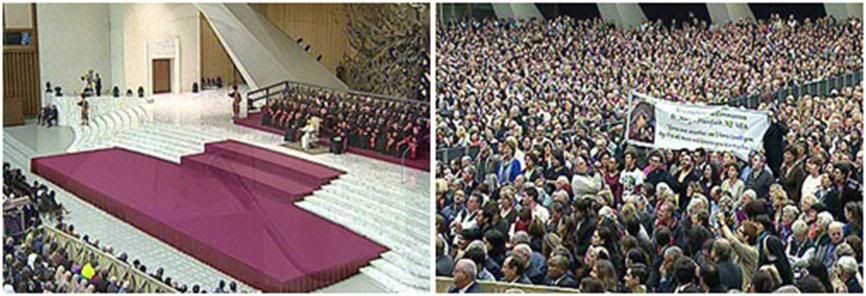
The Holy Father himself introduces today's catechesis best with his synthesis in English:
I have been speaking in recent weeks about medieval theology, and would now like to turn my attention to how the Christian faith of the Middle Ages inspired some of the greatest works of art of all time: the cathedrals of Europe.
Romanesque cathedrals are distinctive for their size and for introducing to churches beautiful sculpture, including the image of Christ as the Universal Judge and the Gate of Heaven.
By entering through Him, as it were, the faithful enter a space and even a time different from everyday life, somewhere they can anticipate eternal life through their participation in the liturgy.
Gradually, Gothic architecture replaced the Romanesque, adding height and luminosity to the previous style. The Gothic cathedral translates the aspirations of the soul into architectural lines, and is a synthesis between faith, art and beauty which still raises our hearts and minds to God today.
When faith encounters art, in particular in the liturgy, a profound synthesis is created, making visible the Invisible, and the two great architectural styles of the Middle Ages demonstrate how beauty is a powerful means to draw us closer to the Mystery of God.
May the Lord help us to rediscover that "way of beauty", surely one of the best ways to know and to love Almighty God.
Appeal for the children of the world
At the end of his plurilingual greetings today, the Holy Father made a special appeal in behalf of the children of the world:
Day after tomorrow, the United Nations will observe the World Day of Prayer and Action for Children, on the 20th anniversary of the adoption of the Convention on the Rights of the Child.
My thoughts go to all the children of the world, especially those who live in difficult conditions and suffer because of violence, abuses, sickness, war or hunger.
I invite you to join my prayers, and at the same time, I appeal to the international community so that it may multiply efforts for an adequate response to the tragic problems of children.
May there be no lack of generous commitment by everyone so that the rights of children may be recognized and that they may be respected more than ever in their dignity.
The Convention on the Rights of the Child is the first international law on children, In its 54 articles, it recognizes that all human beings under 18 are individuals with a right to full physical, mental and social development, as well as the right to express their opinions freely.
UNICEF says that in spelling out the rights of children and minors, the convention also sets standards for the health, survival and progress of every human society; and that its acceptance by almost all the nations of the world has reinforced the acknowledgment of fundamental human dignity in all persons of whatever age in order to guarantee the protection and development of the young.
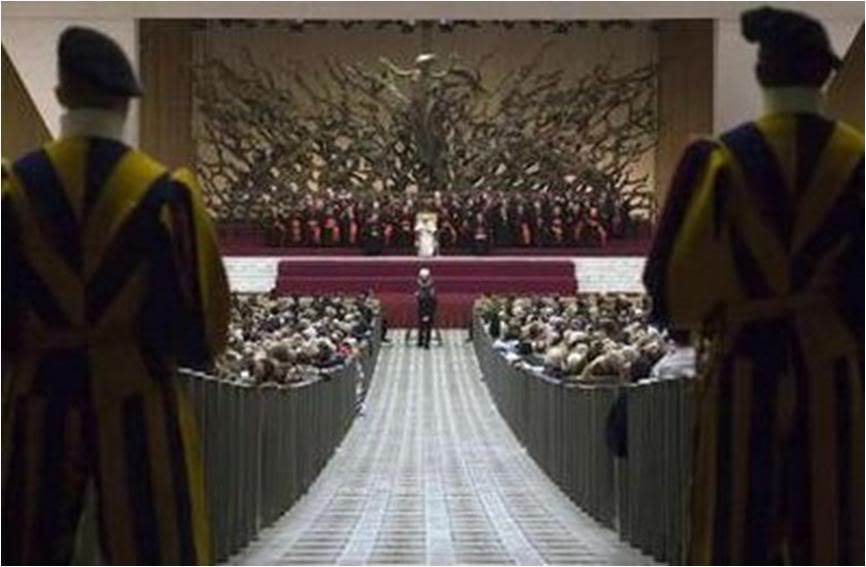
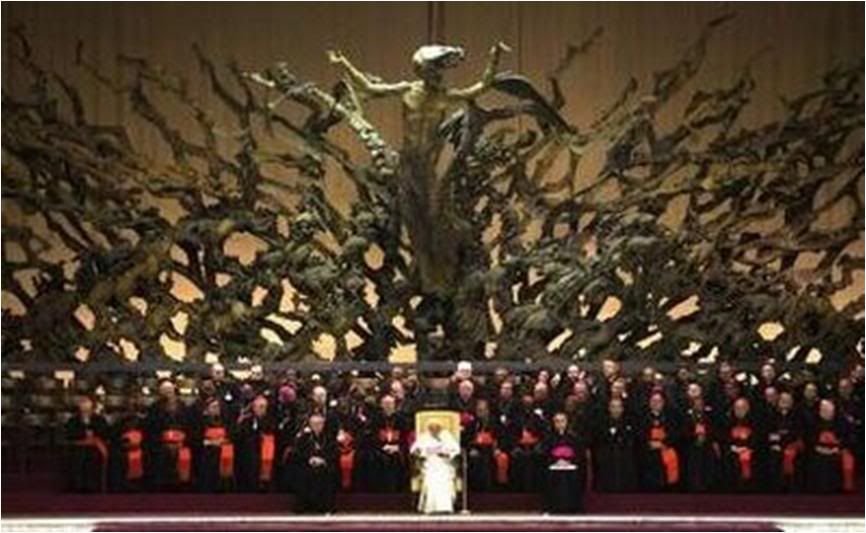
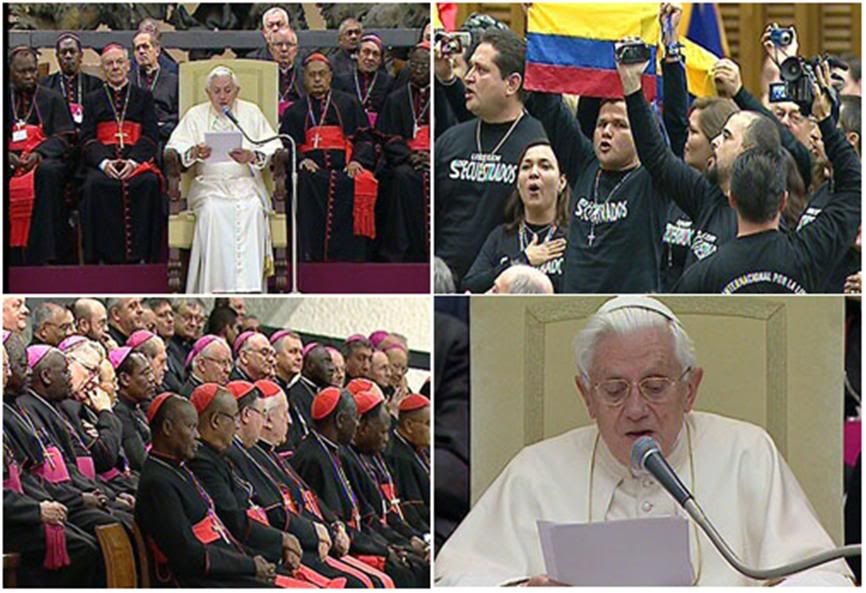
The great medieval cathedrals
and the 'way of beauty' towards God
Dear brothers and sisters:
In the catecheses of the past few weeks, I have presented some aspects of medieval theology.
But the Christian faith, profoundly rooted in the men and women of those centuries, did not give rise only to masterpieces of theological literature, of the thinking of the faith.
It also inspired some of the most elevated artistic creations in universal civilization: the cathedrals, the true glory of the Christian Middle Ages.
Indeed, for almost three centuries, from the start of the 11th century, Europe experienced an extraordinary artistic fervor. A chronicler describes the enthusiasm and industry at that time: "In all the world, especially in Italy and the Gallie [???], they are starting to rebuild the churches, even if many, which are still in good condition, do not need restoration. It is like a race between one place and the other. One would think that the world, shaking off its old rags, wishes to clothe itself anew with the white robes of new churches. In short, almost all the cathedral churches, a great number of monastic churches, and even village oratories, are being restored by the faithful" (Rodolfo il Glabro, Historiarum 3,4).
Various factors contributed to this rebirth of religious architecture. Above all, more favorable historical conditions, like better political security, accompanied by a constant population growth and progressive development of cities, of exchange and of wealth.
Moreover, the architects were identifying increasingly specific technical solutions to enlarge the dimensions of the buildings, while assuring their stability and majesty.
But it was principally thanks to the ardor and spiritual zeal of monasticism in full expansion that abbatial churches were built where the liturgy could be celebrated with dignity and solemnity, and the faithful could stop to pray, attracted by the veneration of saints' relics, which was the goal of incessant pilgrimages.
Thus were born the Romanesque cathedrals and churches, characterized by longitudinal development, with long naves that could accommodate numerous faithful. These were very solid churches, with thick walls of stone, built along simple and essential lines.
One novelty was the introduction of sculptures. Since the Romanesque churches were the place for monastic prayer and for worship by the faithful, sculptors were more concerned with educational ends [the catechetical value of their work] than with technical perfection.
Because it was necessary to arouse strong impressions, sentiments which could inspire the faithful to flee from vice and evil, and to practise the virtues instead, that which is good - a recurrent theme was the representation of Christ as the universal Judge, surrounded by figures from the Apocalypse.
Usually, it was the doors of the Romanesque churches that offered thsse depictions, to underscore that Christ is the Gate leadaing to Heaven.
The faithful, crossing the threshold of the sacred edifice, entered a time and space different from ordinary life. Beyond the church doors, the artists intended that believers in Christ - sovereign, just and merciful - might be able to have a foretaste of eternal beatitude in the celebration of the liturgy and other acts of piety performed within the sacred edifice.
In the 12th and 13th centuries, starting in northern France, another type of church architecture spread - the Gothic, with two new characteristics compared to the Romanesque, namely, verticality and luminosity.
Gothic cathedrals demonstrated a synthesis of faith and art harmoniously expressed through the universally fascinating language of beauty which even today inspires wonder.
Thanks to the introduction of the arched vault resting on robust pillars, it was possible to construct much higher buildings. This elevation was an invitation to prayer, and was in itself prayer. Thus did the Gothic cathedral translate, in its architectonic lines, the yearning of the soul towards God.
Moreover, with the technical solutions reached, windows could be set into the perimeter walls and decorated with polychrome glass. In other words, the windows became great luminous images which were very appropriate for instructing the people in the faith.
Those windows, scene by scene, narrated the life of a saint, a parable, Biblical events. The stained glass windows allowed streams of light within the church while narrating to the faithful the story of salvation and getting them involved in that story.
One other quality of the Gothic cathedrals was that the entire Christian and civilian community participated in their construction and adornment, in different ways but together. The humble and the powerful, the illiterate and the educated, participated together so that in this common home, all believers could be instructed in the faith.
Gothic sculpture made these cathedrals into Bibles of stone, representing the episodes of the Gospel and illustrating the content of the liturgical year, from the Nativity to the Glorification of the Lord.
In those centuries, moreover, the perception of the humanity of the Lord was gaining ground, and the sufferings of his Passion came to be represented in a realistic manner: the Suffering Christ (Christus patiens) became an image beloved by all, appropriate for inspiring piety and repentance for one's sins.
Nor were personages from the Old Testament missing - their stories became very familiar to the faithful who attended these cathedrals as a part of the singular and common story of salvation.
With their faces full of beauty, tenderness and intelligence, Gothic sculpture revealed a happy serene faith, which took special pleasure in establishing a heartfelt filial devotion to the Mother of God, sometimes seen as a young woman, smiling and maternal, but mainly depicted as Queen of heaven and earth, powerful and merciful.
The faithful who flocked to the Gothic cathedrals also enjoyed finding artistic expressions that recalled the saints, models of Christian life and intercessors with God.
Nor was there a lack of the 'secular' aspects of existence. Thus there came to be depictions of work in the fields, of the sciences and the arts.
Everything was oriented and offered to God in the place where liturgy was celebrated.
We can better understand the meaning that was attributed to the Gothic cathedral, by considering the text of the inscription carved on the central portal of St. Denis in Paris: "Passerby, who may wish to praise the beauty of this doors, do not be blinded by gold, nor by magnificence, but rather by effortful work. Here shines a famous work, but Heaven grant that this brilliant work may make spirits shine forth, so that with luminous truth, they can walk towards the true light, to which Christ is the true door".
Dear brothers and sisters, I would like now to underscore two elements of Romanesque and Gothic art that are useful even for us.
The first: the artistic masterpieces both in Europe in past centuries are incomprehensible if one does not consider the religious spirit that inspired them.
An artist, who has always testified to the encounter of aesthetics and faith, Marc Chagall, wrote that "painters for centuries have dipped their brushes into the multicolored alphabet that is the Bible".
When faith, celebrated specially in liturgy, encounters art, a profound syntony is created, because both can and wish to speak of God, making visible the Invisible.
I wish to share this in my meeting with artists on November 21, renewing to them the offer of friendship between Christian spirituality and [contemporary] art that was hoped for by my venerated predecessors, particularly the Servants of God Paul VI and John Paul II.
The second element: the power of the Romanesque style and the splendor of Gothic cathedrals remind us that the via pulchritudine, the way of beauty, is a privileged and fascinating way to get closer to the mystery of God.
What is the beauty that writers, poets, musicians, and artists contemplate and translate into their language other than the reflection of the splendor of the eternal Word made flesh?
St. Augustine says: "Ask the beauty of the earth, ask the beauty of the sea, ask the beauty of the air. Ask the beauty of heaven, ask the order of the stars. Ask the sun, which lights up the day with its splendor. Ask the moon, whose diffuse light softens the shadows of the night. Ask the beasts that swim in water, that walk on the earth, that fly in the air: souls that are hidden, bodies which are seen; the visible that need to be led, the invisible who lead. Ask them! And all will answer: Look at us, we are beautiful! Their beauty makes itself known. And this mutable beauty - who has created it if not Immutable Beauty?" (Discorsi, 241, 2-3).
Dear brothers and sisters, may the Lord help us to rediscover the way of beauty as one of the itineraries - perhaps the most attractive and fascinating - in order to reach, meet and love God.
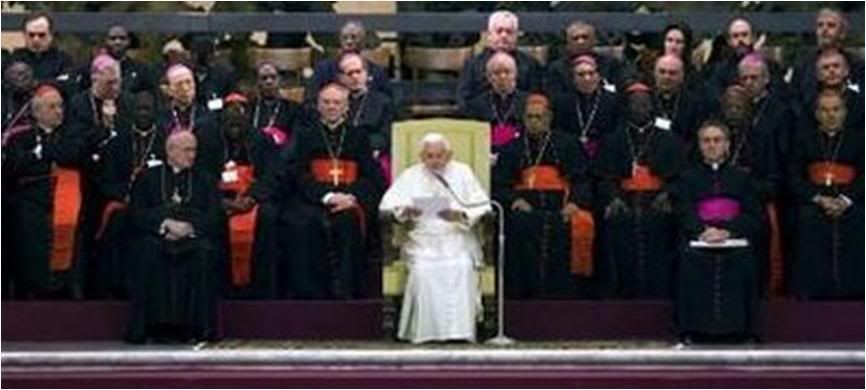
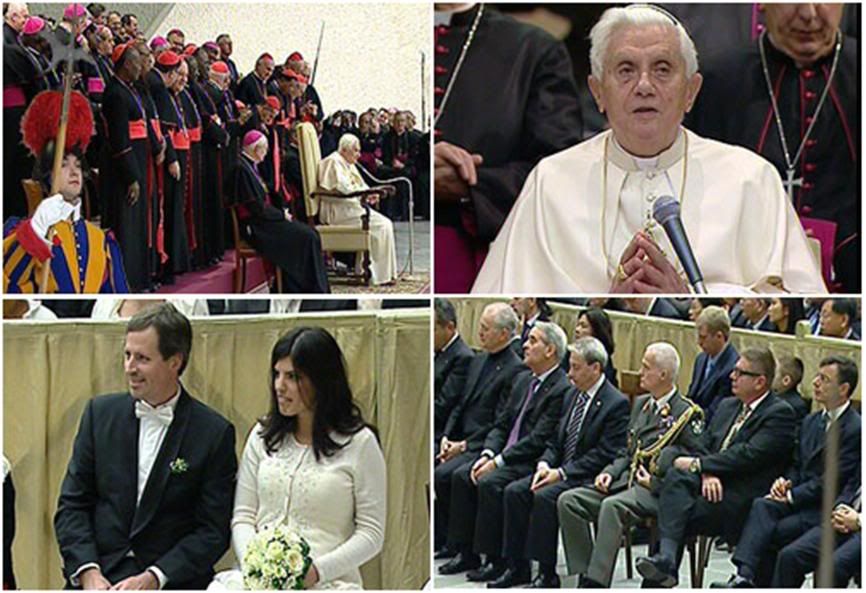
In his greetings to various language groups, the Holy Father recalled the feast today of the Dedication of St. Peter's and St. Paul's basilicas in Rome, to Polish pilgrims and to the Italians, and recalled to Slovakians the recent 20th anniversary of their liberation from the yoke of Communism. In Italian, he said:
I am particularly pleased to welcome the cardinals, bishops and all the members of the Plenary Assembly of the Congregation for the Evangelization of Peoples, presided by Cardinal Ivan Dias.
Your presence gives me the opportunity to renew to each of you my gratitude for the generous commitment with which you work in order to spread the Gospel message.
I entrust your plenary meeting to the Most Blessed Mary, Queen of Apostles, invoking her maternal assistance on all who are engaged in missionary activity in every corner of the earth.
I greet the representatives of the Italian Federation Addetti al Culto ['assistants for worship'] and I express my pleasure for the work they carry out in the preparation and care of liturgical spaces as well as the cultural assets in the custody of the Church.
In today's liturgy, we celebrate the dedication of St. Peter's basilica in the Vatican and that of St. Paul on the Via Ostiense. This feast offers us the opportunity to highlight the meaning and the value of the Church.
Dear young people, love the Church and cooperate with enthusiasm in its edification. Dear patients, offer your suffering as a precious contribution to the spiritual growth of the Christian community. And dear newlyweds, be in the world a living sign of Christ's love.
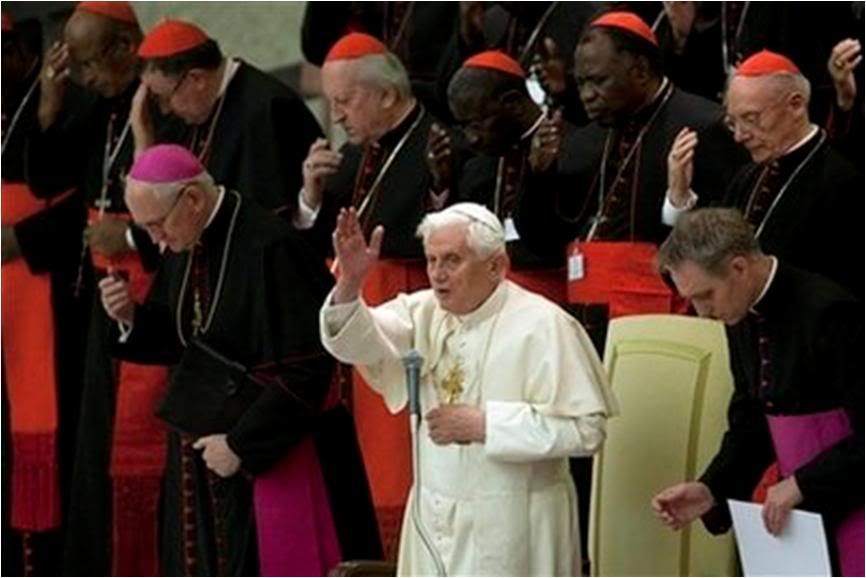
[Modificato da TERESA BENEDETTA 18/11/2009 17:11] |
| |
 18/11/2009 18:15 18/11/2009 18:15 |
|
| | | OFFLINE | | Post: 18.896
Post: 1.544 | Registrato il: 28/08/2005
Registrato il: 20/01/2009 | Administratore | Utente Veteran | |
|

Two atate visitors today:
WITH THE PRIME MINISTER
OF BANGLADESH

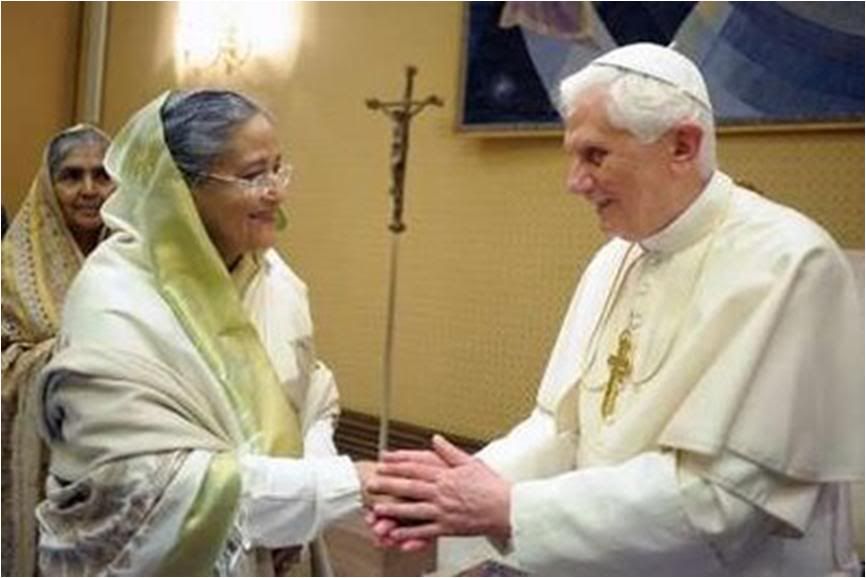
At the end of his general audience today, 18 October, the Holy Father Benedict XVI received Sheikh Hasina, prime minister of the People's Republic of Bangladesh.
She subsequently went on to meet with Cardinal Secretary of State Tarcisio Bertone who was accompanied by Archbishop Dominique Mamberti, secretary for Relations with States.
During the cordial discussions, opinions were exchanged concerning the current situation in Bangladesh, the principal challenges facing the country, and the efforts to promote a society that is ever more open to, and respectful of, the human rights of all its citizens.
Furthermore, with reference to the regular contacts between the civil and ecclesiastical authorities, attention also focused on the positive and much-appreciated contribution the Catholic Church makes to human promotion and social life in the country, through her activities of education, healthcare and assistance.
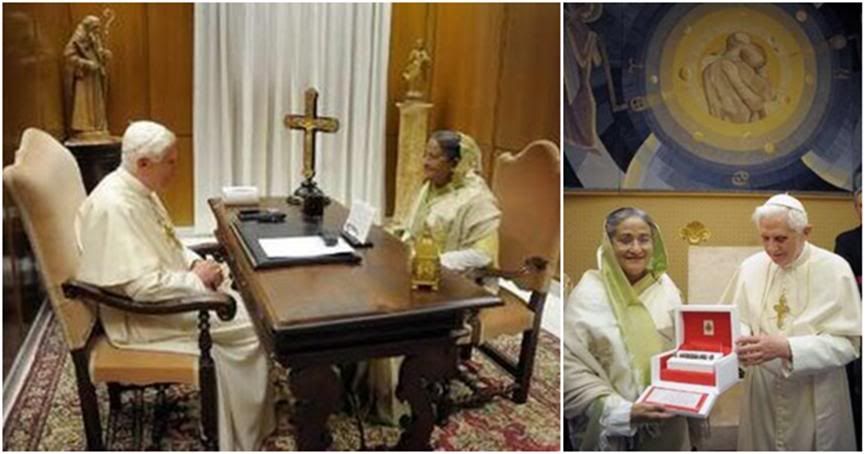 WITH THE PRESIDENT OF BURUNDI
WITH THE PRESIDENT OF BURUNDI

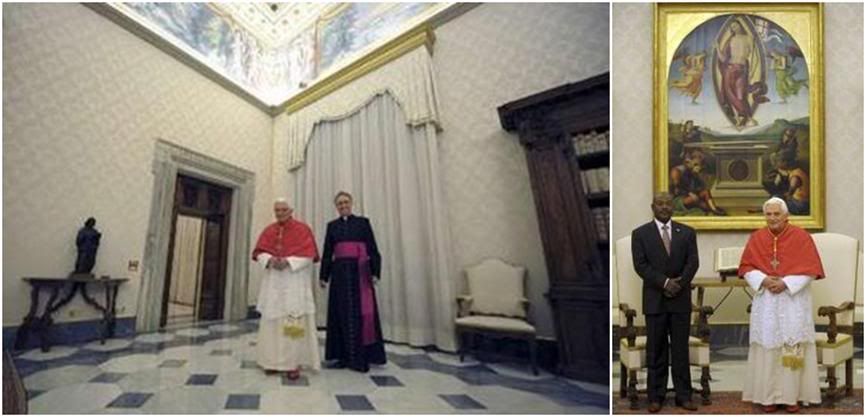 Left photo is a rare one showing the 'geography' of the library where the Pope receives guests in private audience. The doorway where he usually greets them is just a few steps away from the Risen Christ portrait where the formal photographs are taken.
Left photo is a rare one showing the 'geography' of the library where the Pope receives guests in private audience. The doorway where he usually greets them is just a few steps away from the Risen Christ portrait where the formal photographs are taken.
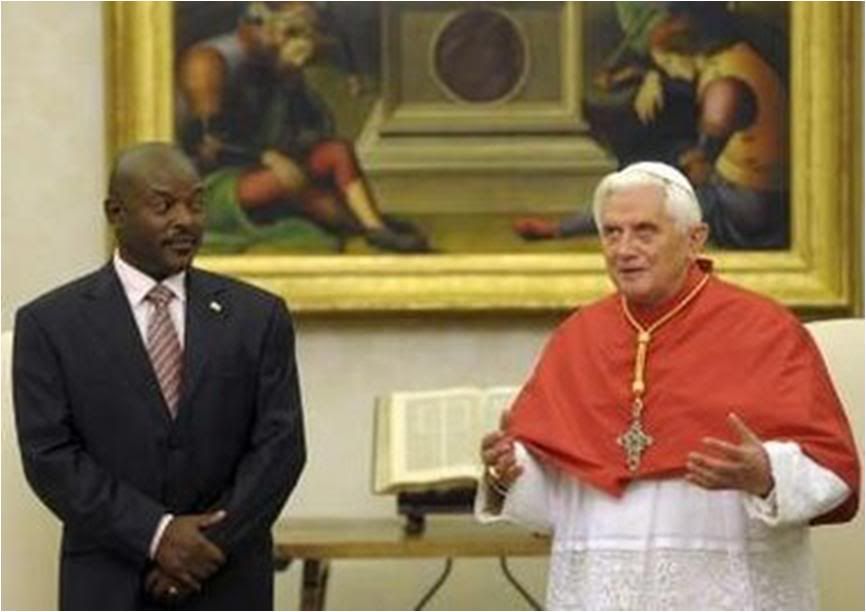
On the evening of Tuesday 17 November, in the Vatican's Apostolic Palace, His Holiness Benedict XVI received in audience Pierre Nkurunziza, president of the Republic of Burundi.
The President subsequently went on to meet Cardinal Secretary of State Tarcisio Bertone S.D.B., who was accompanied by Archbishop Dominique Mamberti, secretary for Relations with States.
In the course of the meetings, which took place in a cordial atmosphere, questions of mutual interest were considered, such as the importance of dialogue and of respect for human rights, as fundamental elements in the creation of a stable society oriented towards the good of all its members.
Emphasis was likewise given to the Church's commitment to contributing to the integral development of the nation of Burundi in the fields of spiritual assistance, education, healthcare and social-humanitarian work.
In this context, the hope was expressed for a framework agreement to define and guarantee the juridical status of the Church and her activities in the country.
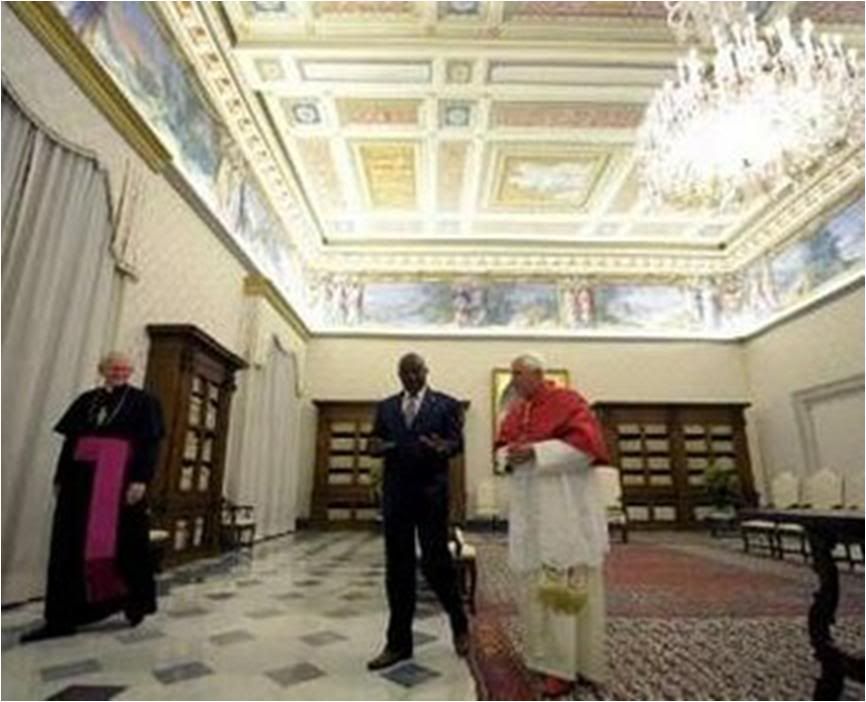
[Modificato da TERESA BENEDETTA 18/11/2009 18:15] |
| |
 19/11/2009 02:04 19/11/2009 02:04 |
|
| | | OFFLINE | | Post: 18.899
Post: 1.547 | Registrato il: 28/08/2005
Registrato il: 20/01/2009 | Administratore | Utente Veteran | |
|
 Cardinal Sodano represents Pope
Cardinal Sodano represents Pope
at Serbian Patriarch's funeral today
Translated from
the 11/19/09 issue of


The funeral rites for Patriarch Pavle, head of the Serbian Orthodox Church, will take place Thursday morning at the Cathedral of St. Saba in Belgrade.
Participating in the name of the Pope are Cardinal Angelo Sodano, dean of the College of Cardinals, who leads a delegation that includes Archbishop Orlando Antonini, Apostolic Nuncio in Serbia; and Fr. Milan Zost, S.J., from the Oriental section of the Pontifical Council for Promoting Christian Unity.
Patriarch Pavle, 95, died Sunday in a military hospital after a long illness.
Here is a translation of the telegram of condolence sent by Pope Benedict XVI to the Patriarch's temporary replacement:
To His Eminence
Amfilohije
Archbishop of Cetinje,
Metropolitan of Montenegro,
Locum tenens of the Patriarchal Throne
Holy Synod of the Serbian Orthodox Church
The sad news has reached me that the Lord has called to him His Holiness Pavle, Patriarch of the Serbian Orthodox Church.
I wish to extend to you, to the Holy Synod and to all the members of the Church, my heartfelt condolences, assuring you of my union in prayer with those who mourn their Father and Pastor.
Through a long life in the service of the Gospel, the late Patriarch has given testimony of faith and spiritual strength in in particularly difficult moments marked by conflicts and wars.
I ask the Lord that his example may be of comfort to the hearts of his faithful and so many other men of good will who, urged on by his perseverance, are committed to living the Christian faith fully and to serve with zeal the great cause of reconciliation and peace.
I remember with gratitude the generous and warm hospitality that His Holiness Pavla showed the members of the Mixed International Commission for Theological Dialog between the Catholic and Orthodox Churches during their plenary meeting in Belgrade in September 2006.
He showed so many other gestures of fraternity towards the Catholic Church and meetings between Catholics and Orthodox that took place with his blessing.
May the pain of Patriarch Pavle's passing be transformed to a sure hope in his 'birth in heaven' and may his memory continue to inspire a strong spiritual growth in the people whom he served with dedication and generosity.
May his memory also serve as an invitation for everyone to follow the path of dialog and the search for full communion among all the disciples of Christ.
I also wish to express the hope that the Lord may accompany the activity of the Holy Synod in this time of transition.
With affection in the Lord,

From the Vatican
16 November 2009
[Modificato da TERESA BENEDETTA 19/11/2009 02:05] |
| |
|
|
|
|